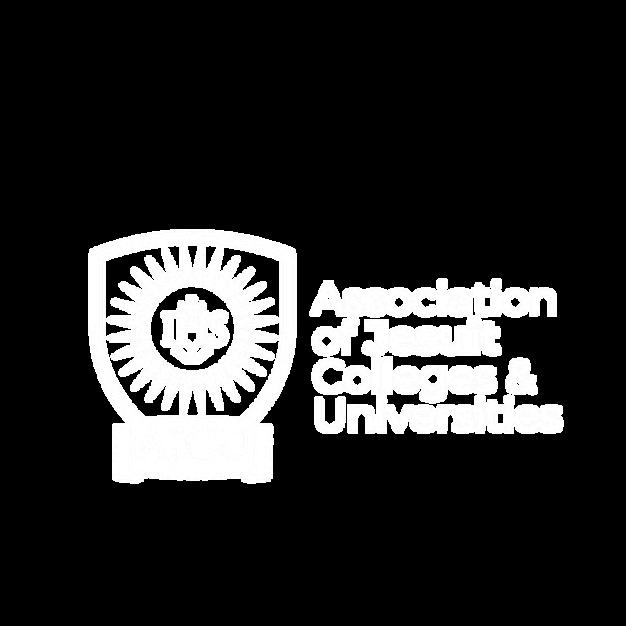IN TRUST
A MAGAZINE FOR TRUSTEES IN JESUIT HIGHER EDUCATION





“No one is a president or a Board chair by default. You have chosen to serve as presidents and Board chairs deliberately, in a free and generous response to the call that each one has experienced, one way or another, in his or her heart … a call that I would presume to identify as the mysterious and gracious movement of the Holy Spirit. We Jesuits therefore don’t just want to work for and with you: we want to partner with you in mission. Together, we must nurture the Jesuit and Catholic identity and mission of each of the universities and of the network as a whole ” - Rev Arturo Sosa, S J , Superior General, Society of Jesus
Above: AJCU presidents and board chairs met with Jesuit Provincials for a meeting with the Jesuit Superior General at Loyola University Chicago in April 2024
Letter from AJCU's President: 1
AJCU Board Chairs, Presidents & Provincials Meet with Jesuit Superior General: 2
The Call to Leadership of a Jesuit University: 3
Provincial Reflections on Meeting with Jesuit Superior General: 12, 14
Reflections on Assembly ‘24: 19
Chairs Corner: 23
A Jesuit's Perspective on Intercollegiate Athletics: 28
October 2024
AJCU Trustee Forum: 35
In Memoriam: Michael R Lovell, PhD: 37
Registration Now Open for Spring 2025
AJCU Trustee Forum!
April 4-6, 2025
Loyola University Chicago’s Water Tower Campus Click here to register online.
“Today, more than ever, the universities need your mission governance. And this capacity for mission governance is not conferred automatically on every trustee. It must be cultivated through encounters like this AJCU Trustee Forum.”
Rev. Arturo Sosa, S.J., Jesuit Superior General
Jesuit colleges and universities in North America benefit from the contributions of nearly 1,000 trustees who guide the schools’ mission and work. The AJCU Trustee Forum provides trustees with the opportunity to ground their service in the heart of the Jesuit mission, connect with counterparts at a wide range of schools, and sharpen skills needed for contemporary board leadership.
Questions? Please contact Joe DeFeo: jdefeo@ajcunet.edu
We look forward to seeing you in April!


Welcome to the start of a new academic year There is considerable excitement on all of our campuses, as convocations and Masses of the Holy Spirit are drawing our community members together But clearly, the FAFSA debacle and the socalled demographic cliff are beginning to put pressure on many schools as their enrollment plans have needed to be modified. No doubt your board has been studying these trends. At AJCU, we follow closely and advocate with Congress and the U.S. Department of Education on a regular basis.
This issue of In Trust could easily be the pre-read for an entire Board Retreat. We hear from Jesuit Superior General, Rev. Arturo Sosa, S.J., who addressed our Jesuit Provincials, Board Chairs and Presidents this past April. His encouragement of our mission in higher education in North America, and his reflections on the critical issues confronting our world and the students we teach are insightful and full of wisdom. Two Provincials follow with reflections of their own. Rev. Karl Kiser, S.J., of the Midwest Province, reflects on our support for the local and world-wide Catholic Church, while Rev. Joseph O’Keefe, S.J., of the Jesuits East Province, discusses Jesuit assignments.
How our faculty, staff and administrators are tackling some of the pressing issues of the day (and their relevance to Jesuit higher education) was the subject of the AJCU Faith, Justice & Reconciliation Assembly: a summer gathering of more than 360 delegates from nearly all AJCU institutions.
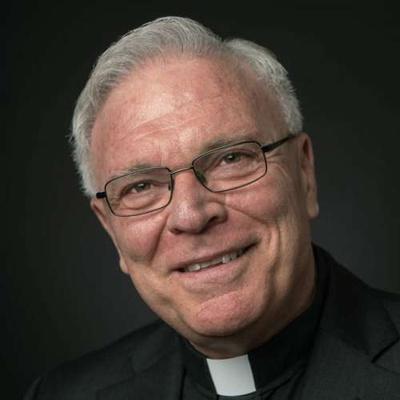
The Assembly was the culmination of two years of preparation by six Commissions of faculty and staff who addressed Citizenship and Democracy; Laudato Sí’; Jesuit Prison Education; Student Spiritual Growth and Mental Health; Justice and Reconciliation; and the Ignatian Pedagogical Paradigm. You will learn more from Assembly Coordinator Joseph DeFeo.
In this issue, we launch what we hope will be a standard feature of Board Chairs sharing ways they are strengthening their Boards. Our inaugural chairs are Jack Boland of the University of San Francisco, Derek Scarth of Regis University, and Nancy Creasy of Rockhurst University.
Finally, I invite you to read an interview with Rev. Patrick Kelly, S.J., an expert on the unfolding and chaotic world of college athletics. How should we approach the changes both challenges and opportunities in motion in this area of our University life?
Take your time reading through this issue.
Rev. Michael J. Garanzini, S.J. President, AJCU


On April 6, 2024, the presidents and board of trustee chairs for member institutions of the Association of Jesuit Colleges and Universities (AJCU) met with the Jesuit Superior General, Rev Arturo Sosa, S J , during a meeting with the Provincials of the U S Jesuit Provinces at Loyola University Chicago The meeting was convened by AJCU and the Jesuit Conference of Canada and the United States (JCCU) in order to accomplish the following goals:
1 Continue the development of a corporate sense of purpose regarding the Society of Jesus’ mission in higher education, including how the Mission Priority Examen (MPE) functions to assure a commitment to the Catholic and Jesuit identity of the institutions
2 Initiate a collective discernment with the Jesuit Provincials of the challenges and opportunities faced by Jesuit, Catholic higher education today, by sharing perspectives and hopes regarding this apostolic endeavor
3 Carefully examine the way that governance in Jesuit higher education is evolving, the potential for development within the AJCU network of institutions, and the sharing of best practices
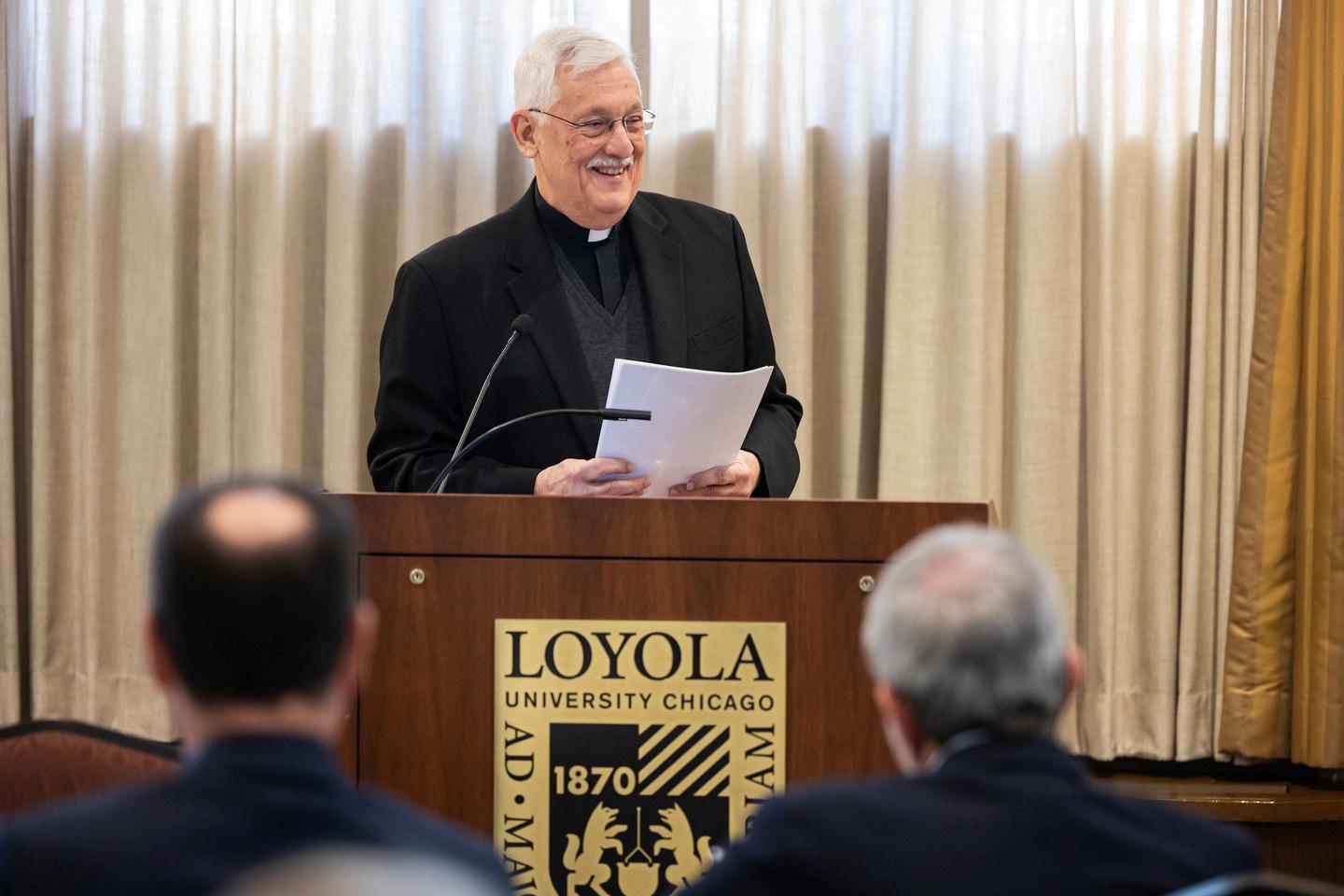
In his remarks to the attendees (shared on the following page), Fr Sosa addressed the responsibilities of presidents and chairs as the key leaders of their institutions, and urged strong ties with the Society of Jesus in order to strengthen their Jesuit character


Rev ArturoSosa,SJ,SuperiorGeneraloftheSocietyofJesus
I am very happy to meet today with the presidents and Board chairs of North American Jesuit universities, together with the Provincials and other friends Thank you for being here
Leadership at a Jesuit university is a very demanding job I know that For ten years, I myself was a university president Every day, my team worked on enrollment and faculty recruitment, on curriculum and technology, on facilities and finances, on social outreach and government relations
University leadership is a challenging job, but it is not only a job It is a call, a vocation This morning, I would like to develop this call in three steps First, we must look courageously at the world in which we live, the world to which we are sent Second, we need to recall some fundamentals of the Jesuit charism Third, I want to reflect on partnership in mission in a practical way that touches, among other points, on the Mission Priority Examen



Sosa (continued)
A phrase that appears very often in the Constitutions of the Society of Jesus is “according to the circumstances of persons, places, and times ” We need to begin our consideration of university leadership by considering our circumstances
Let’s speak plainly We live in a world at war Every day, we see the results of appalling international conflicts in Ukraine and Gaza We see civil war in Sudan and generalized violence in Haiti In Europe, we see a kind of war against newcomers, against outsiders with strange ways, against migrants and refugees Conflicts are fueled by nationalism, racism, tribalism, caste discrimination, and sometimes by religious intolerance
We are losing the skills needed even for reasonable and respectful dialogue across differences, much less the disposition to negotiate in order to reach the goal of all true political action: the common good.
We live in a world ever more conscious of the reality of climate change Some years ago, a senior American politician said to me, rather dramatically, “Father, my lifelong effort to support just wages for working people won’t mean much if we end up destroying life itself ” Four years ago, we thought that the experience of a global pandemic would change us, making us more sensitive to the urgent need to care for our common home Did it? I don’t think so
In our world, technology outruns our understanding of its possibilities and dangers In 2011, Rev Adolfo Nicolás, S J , my predecessor as Superior General, warned an international meeting of university leaders that the explosive growth of social media posed a risk of “the globalization of superficiality ”
The problem was worse than he knew It was not just that Facebook made it too easy to “friend” and “unfriend” people The problem was that we began to listen only to our “friends” and to repeat whatever they repeated, without worrying about whether or not it was true Today, we are at the beginning of an even more farreaching technological change, glimpsing the enormous potential of Artificial Intelligence without yet understanding its consequences Unfortunately, our legislatures struggle even to approve budgets, much less to orient the use of new technologies toward the common good
Peacebuilding, care for the common home, orienting the use of new technologies toward the common good What makes all these problems particularly difficult is the collapse of dialogue We speak, but we do not listen We are losing the skills needed even for reasonable and respectful dialogue across differences, much less the disposition to negotiate in order to reach the goal of all true political action: the common good


Sosa (continued)
The Venezuelan political scientist Moisés Naím writes about the three “p’s” of populism, polarization, and a post-truth practice of political rhetoric As a student of political science myself, I see this as a crisis of democracy, a crisis of citizenship, a crisis of responsible participation by everyday citizens in shared processes of decision-making, and a crisis of accountability for politicians as public servants
If we look specifically at higher education in North America, we can see all these challenges and more Demographic change means that far fewer young people will soon be seeking to enroll Cultural change means that fewer families fully appreciate the value added by formation in a Catholic and humanistic tradition if it costs them more than education in a state school The search for students leads to competition in the construction of expensive facilities and to heavily discounted tuition fees
Financial viability is a real question for many Jesuit universities in North America I have heard some say that “the business model is broken ” A Vatican official once asked me, “If a Jesuit university closes, who claims the assets?” I was tempted to respond, “The real question is who inherits the debts!”
But all of these challenges are only half the story When a Jesuit looks at the world, he also sees the grace of God at work The Jesuit Superior in Haiti wrote to me two weeks ago: “Armed groups of bandits are taking over more and more territory The streets are empty It is like living in an open-air prison We are furious that our country has not been capable of finding a way forward, but we are not afraid, and we have not lost hope ”

(Above: Tania Tetlow,
President of Fordham University and Chair, AJCU Board of Directors)
We are not afraid, and we have not lost hope Our university communities can also say exactly that We are not afraid of these challenges, and we have not lost hope I sense hope, not fear, when I your institutes that link ed sciences with the good of fundamental medical research obal public health, engineering s with environmental bility, theology programs with outreach I sense hope, not fear, ur universities open space for conversations that make people rtable, conversations about the d the future, about cultures and s, about what it means to be nd who we are called to become nse more hope than fear when I speak with our students, young adults from a wide range of religious and cultural backgrounds who seek to lead lives of goodness, integrity, meaning, and love


Sosa (continued)
The Jesuit Charism
I would like to speak now about the Jesuit charism that marks the way of proceeding of Jesuit universities As many of you know, the second week of St Ignatius’ Spiritual Exercises begins with a contemplation on the incarnation We imagine the Holy Trinity looking down upon the whole surface of the globe and all its people in all their diversity of dress, language, and way of life Looking at this creation, God is so moved with compassion and love that the Trinity sends the Divine Word into the world to save it, to open to all people the fullness of life
In the late 1520s, a few graduate students at the University of Paris felt themselves to be called to serve that Divine Word, following the way of life of Jesus poor and humble, serving the mission of reconciliation and justice that he left to the Church
Ten years later, they recognized that they were called not just to serve as individuals but to join together as a universal apostolic body, a small Company to serve the mission of the Church wherever the Pope decided to send them, anywhere in the world, always seeking the greater praise and service of God and help of souls The foundational document approved by the Pope Julius III in 1550 describes our work very expansively, including “any works of charity according to what will seem expedient for the glory of God and the common good ” We still engage in an enormous variety of works, but educational ministry has become in many ways a signature apostolate
The foundational charism of the Society of Jesus marks our university communities with a particular style They embody a specific form of “intellectual apostolate,” a mission received as a gift of the Holy Spirit As apostles, we are sent We hear a call, accept the invitation, and are sent on mission If we simply mimic what others do, we are not living up to our vocation

We share with all universities a commitment to teaching, research, and service, but we bring our own charism to bear on those activities Our universities must not set aside the humanities but instead integrate them with the natural and social sciences in an orderly fashion, helping students to discover an overarching framework within which their choices have meaning Our style of learning is Ignatian, active, engaged, and rooted in experience
(Left: Rev Brian Paulson, S J , President, Jesuit Conference of Canada and the United States)


Sosa (continued)
Our universities prize religious experience, not locking it away in some corner of personal preference but bringing it openly into dialogue with other human experiences Our universities should be places of solid education, but not only that They should bear witness to the Good News of Jesus Christ Our universities are diverse, multicultural and intergenerational communities that always involve learning together and often involve living together We hope that our students will grow to be friends with one another, friends with the poor, and friends in the Lord
Our educational charism invites us all, as Pope Francis often says, to integrate head, heart, and hands In fact, all the perspectives that Pope Francis gave to the Society of Jesus to orient our work today, all four of the Universal Apostolic Preferences (UAPs), are very much at play at the colleges and universities:
Showing the pathway to God; Walking with the excluded; Accompanying young people in constructing a hope-filled future; Collaborating in care for our common home.
These Preferences are becoming the main criteria for decision-making, guiding research, teaching, service, and collaboration All of our institutions participate in this one mission: a universal mission Institutions have a legitimate autonomy, and market pressures push each one to compete with the others
However, we will be much stronger if we understand ourselves to be part of a network, if we contribute to the network, if we leverage the strength of the network for greater service If each university goes its own way, the future is very uncertain If we understand ourselves, each of the universities, as complementary parts of one body, then we can face the future with hope
Finally, our charism is also a charism of choice, of election Faced with a choice between two goods, we discern and deliberately choose the one that is more conducive to the praise and service of God and help of souls in the context of a universal vision that gives us the freedom to choose the more universal good Individuals are called to make such elections, and so are communities An implication of this spirituality of election is that a university cannot be a Jesuit university without choosing that identity over and over again, through one concrete choice after another If a university stops actively choosing to be Jesuit, then we should talk without any fear about the possibility of parting ways
For some of our most cherished colleagues, working at a Jesuit university is not a vocation It is just a job A good job, but still, basically, only a job That is not true of anyone in this room No one is a president or a Board chair by default You have chosen to serve as presidents and Board chairs deliberately, in a free and generous response to the call that each one has experienced, one way or another, in his or her heart a call that I would presume to identify as the mysterious and gracious movement of the Holy Spirit


Sosa (continued)
We Jesuits therefore don’t just want to work for and with you: we want to partner with you in mission Together, we must nurture the Jesuit and Catholic identity and mission of each of the universities and of the network as a whole
In 1998, two leaders of important Vatican Dicasteries wrote to Rev Peter Hans Kolvenbach, S J (a former Jesuit Superior General), asking what sort of structure the Society of Jesus intended to use to assure the Catholic and Jesuit identity of universities governed not directly by Jesuit superiors but by largely independent Boards of Trustees The whole idea of Boards puzzled them greatly One said, “The people who control the money control the mission If the Boards control the money, they control the mission What gives the Society of Jesus confidence in their governance for mission?”
Over the following fifteen years, much was done to strengthen the Jesuit identity of all members of the university communities, from trustees to groundskeepers, particularly through mission formation programs There were also experiments in governance such as reserving certain decisions to a separate Board of members controlled by Jesuits By 2015, it was clear that the way forward in governance was not to be found in a mechanism of control but in a lively and engaged partnership among all of us who have the vocation of Jesuit university leadership
Your discussions here may well have developed new ways to exercise that partnership I look forward to hearing about them Until now, I have looked to two particular characteristics to give me confidence in the vibrancy of a particular university’s Jesuit identity and mission
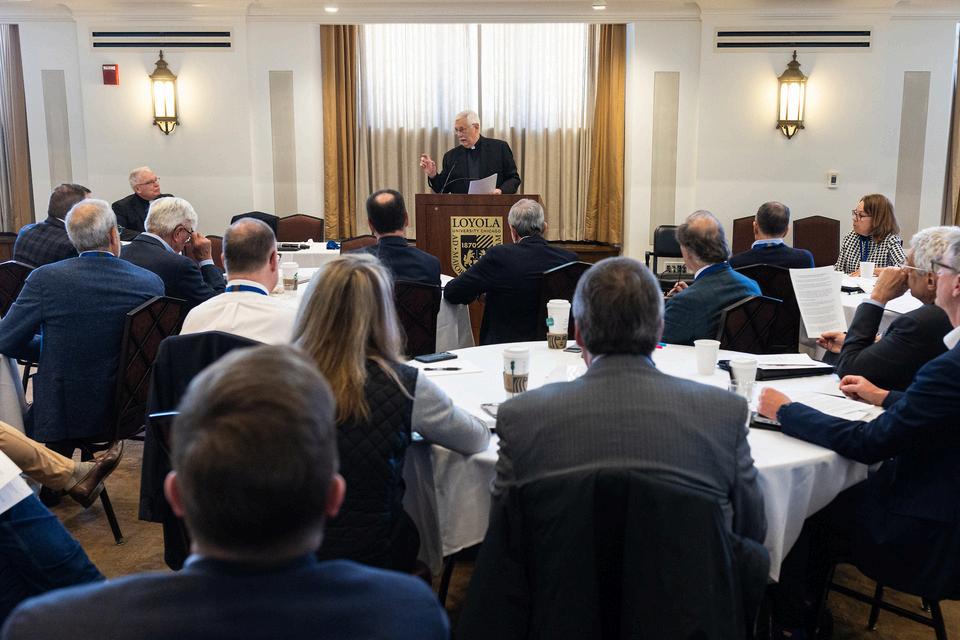


Sosa (continued)
First, the university has to have a strong relationship with its Provincial and, through him, with me This living relationship to the Society of Jesus was authoritatively identified by our 35th General Congregation in 2008 as distinguishing a Jesuit work from the larger group of Ignatian works (Decree 6, number 10) This relationship is nurtured by the Provincial’s annual visitation, but also in many other ways, including meetings like this one, meetings at the Province level, meetings with the Provincial’s assistant for higher education, and participation in Province apostolic planning All Jesuit governance depends on knowing one another, trusting one another, delegating authority in appropriate ways, sharing complete information, and maintaining transparent communication
Second, I need to know that the university community engages in ongoing discernment of the steps it should take as it seeks the Magis, strengthening its mission and identity in response to changing circumstances This discernment should always be underway, but it reaches a high point of intensity in the periodic Mission Priority Examen (MPE) in which the Board chairs play an important role
I know that several of your universities are involved in your second MPE this year I have not yet seen those reports However, I have read thirty reports in past years, and I would like to mention a few of the themes that have emerged
I have learned that both the product and the process of the MPE are important A president once confessed amazement at the enthusiastic response of the people who were invited to participate in the MPE on his campus He thought people would see it as a burden, an annoying requirement to check off Instead, people were energized by meaningful conversations about identity and mission Experience shows that the MPE is most effective when it is broadly participative, including not only trustees and administrators but faculty, staff, students, and local stakeholders, including the bishop and leaders of other Jesuit works in its region, “according to the circumstances of persons, places, and times ” This experience is itself formative
The MPE is designed as an Ignatian Examen Elements in the process may take on the flavor of an accreditation or an exercise in strategic planning, but the Examen can and should be more The process starts by recognizing and giving thanks for all the good that has been done and all the gifts that have been received Its final goal is to make choices about next steps, seeking the Magis as in an everyday Ignatian Examen The goal is not to marshal evidence of having met criteria for accreditation
All Jesuit governance depends on knowing one another, trusting one another, delegating authority in appropriate ways, sharing complete information, and maintaining transparent communication.


Sosa (continued)
An impressive list of past achievements is not enough to give me confidence in confirming the Catholic and Jesuit identity of a university What matters even more is the university community’s demonstrated ability to make an Ignatian Examen, accompanied by visitors from other Jesuit universities who are partners in a discernment process, not inspectors What matters is the ability to discern the next steps to which we are called by the Holy Spirit, steps that are clear, strategic, achievable, and verifiable
What have we learned from past Examens? We know that the universities reflect the diverse regional cultures in which they are embedded the circumstances of persons, places, and times In general, there is a widespread commitment to Jesuit identity and mission People working with the academic curriculum, with service learning, with student development, and with admissions, all use identifiably Jesuit language Often faculty, staff and students ask for even more opportunities for systematic, deep and continuous formation for mission.
There are many initiatives to expand access to the university and to develop truly intercultural communities. In this regard, I want to say a special word of thanks to the universities that welcome Jesuit graduate students from the global South.
I have also read about challenges Many find it easier to talk about service than to talk about faith The broad commitment to Jesuit identity is sometimes rather shallow Mission initiatives often depend on the personal commitment of charismatic individuals and are not embedded in the structures of the university We are quick to take on positive values of the cultures in which we are embedded, such as a concern for ecology and for inclusion, but we do not always have the ability to question those cultures by drawing on the Catholic intellectual tradition I have also seen that financial constraints can be ignored when a university commits to unrealistic next steps
I am always happy when an MPE process asks a local Jesuit community to step up its game, developing a more corporate apostolic presence at the university I also want to say, however, that having fifteen Jesuits or five or none at all working fulltime on a university campus cannot by itself “make” or “break” the university’s Catholic and Jesuit identity If we can field a team of fifteen Jesuits, wonderful. If we can’t, let’s remember that for the past several decades the vitality of the mission has depended less on us Jesuits than on those with whom we partner.
(Below: Meeting attendees listen to Fr. Sosa’s address)
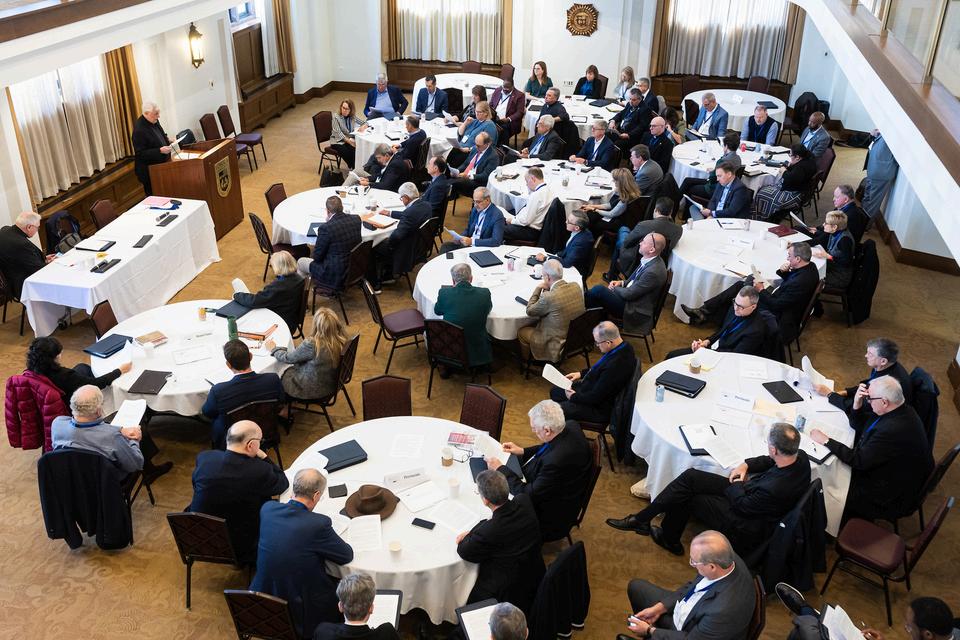


Sosa (continued)
Tanto bien recibido
I love the university apostolate Once I start talking about it, I find it hard to stop I’ve not yet spoken about leveraging better the enviable international network of Jesuit universities to strengthen the universities in North America I have not spoken about the selection and support of university presidents as directors of apostolic works I have not spoken about what can and cannot reasonably be expected from a local Jesuit superior who may well serve a university, a “traditional” high school, a Cristo Rey school, a Nativity school, a parish, or a retreat house I have said little about the extremely competitive environment in which the universities carry out their mission But I think I have said enough! Now I would like to hear from you
I want to close by thanking the presidents, the Board Chairs, the Provincials and their staffs for your outstanding service Through your efforts, God is giving much to the world Thank you for embracing Jesuit university leadership, not as a job, but as a vocation Keep up the good work! May God bless you all.
Fr. General describes a formidable series of challenges confronting higher education today and yet can say (echoing the Jesuit of Haiti), “We are not afraid, and we have not lost hope ” Amidst the challenges you face in your role as a trustee, what gives you hope?
An important characteristic of the network to which Jesuit universities belong globally is their embrace of the Universal Apostolic Preferences (the UAPs: defined and discussed on p. 7). What progress has your university made on embodying the UAPs in the last several years?
Regarding the Mission Priority Examen (MPE), Fr Sosa says: “The goal is not to marshal evidence of having met criteria for accreditation An impressive list of past achievements is not enough to give me confidence in confirming the Catholic and Jesuit identity of a university. What matters even more is the university community’s demonstrated ability to…discern the next steps to which we are called by the Holy Spirit, steps that are clear, strategic, achievable, and verifiable.” In your school’s last MPE, what were the “mission enhancements” it recommended and what is the status of those initiatives?

By Rev Joseph O’Keefe, S J , Provincial, Jesuits USA East Province
A central task of a Jesuit Provincial is to prepare members of the Society of Jesus for effective ministry For those seeking positions at colleges and universities, we consider the following questions: How ought we prepare men for tenure-track positions, staff positions, or significant leadership roles (presidents, vice presidents, provosts, or deans)? And how should we prepare Jesuits to be effective members of college and university boards of trustees?
Another concern is how we mission men, that is, where we choose to send them and why For years, a Provincial would send a man to studies to prepare for a role at one of the higher education institutions located in his Province But today, men are made available for assignment at all institutions across the United States (and beyond)
What guides the Provincials’ thinking about where Jesuits should be sent? In addition, if we need to assign Jesuits to a subset of AJCU schools, what criteria would be appropriate? When it comes to assigning placements, I like to use the metaphor of raising the flag up the pole to see who salutes. A tenure-track Jesuit candidate’s CV and letter of interest are circulated to all member institutions of the Association of Jesuit Colleges and Universities (AJCU). Some (but by no means all) AJCU schools will express their interest.
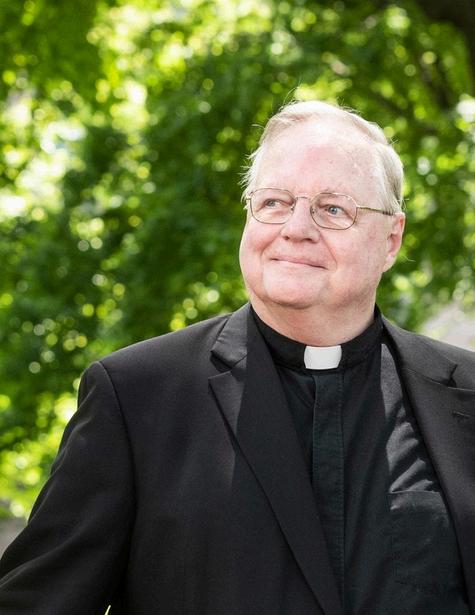
The five Provincials then choose a subset of schools where the man will interview from among those institutions that have shown their interest The Jesuit will then interview with three or four schools When offers are made and the Jesuit states his preferences, we Provincials collectively decide which offer he will accept
This works well for Jesuits seeking tenuretrack positions But we need more clarity about the assignment of mid-career Jesuits who may seek to change schools I also think we could be more creative when it comes to exchanges with Jesuits from outside of North America At present, only 14% of the Jesuits worldwide are in the Jesuit Conference of Canada and the United States. Could our hiring be more reflective of the universal Society?
Here are some questions that are on my mind as I reflect on where we might best invest our available “manpower.” First, is the school welcoming of new Jesuits?


O’Keefe (continued)
Among the things that I think make a school welcoming of new Jesuits would be policies in place to facilitate Jesuit hiring, a well-placed contact person who can oversee the process, and a capacity for and interest in creating faculty lines I also very much want to send Jesuits to places that are vibrantly Ignatian, Jesuit, and Catholic But how is that assessed?
Here are some possible ways
First, is the curriculum (undergrad, grad, professional) imbued with the Catholic intellectual tradition? I think especially of the 2010 address about the globalization of superficiality by former Jesuit Superior General, Rev Adolfo Nicolas, S J : “The globalization of superficiality challenges Jesuit higher education to promote in creative new ways the depth of thought and imagination that are distinguishing marks of the Ignatian tradition ” How do curricula at schools to which I might mission Jesuits encourage such “depth of thought and imagination”? Do the curricula present at schools reflect the seamless garment of Catholic Social Teaching (life and dignity of the human person; call to family, community, and participation; dignity of work and rights of workers; solidarity; care for God’s creation; a preferential option for the poor and vulnerable)?
I also want to send Jesuits to places that are deliberate about creating a student body where there is socioeconomic, racial, and ethnic diversity, and where there is a preference for students from underserved populations Similarly, does the school consciously work to create an atmosphere where religious belief and practice are fostered across the spectrum of faith traditions?
Is there also a vibrant community of practicing Catholics among students, faculty, and staff? Is the chief mission officer effective? And what about the office of campus ministry? I’m also curious to see if there is deliberate networking and collaboration with other local Jesuitsponsored works (secondary and presecondary schools, parishes, retreat houses), as mandated by the 36th General Congregation’s decree, Renewed Governance for Renewed Mission
And finally, it’s important that the Jesuit community works to foster a corporate apostolic presence, where the whole is greater than the sum of its parts, and the Jesuit presence at a particular school is not simply what individual Jesuit scholars and Jesuit staff can do Given smaller numbers and the desire for a vibrant presence on campus, renewal of community life is key Gone are the days of large numbers of Jesuits at a given school – there were 121 Jesuits at Boston College when I joined the faculty there in 1991!
In conclusion, will there be twenty-eight schools within the AJCU network ten years from now? If so, how do we prepare for tomorrow today?
Fr O’Keefe gives a kind of “checklist” of institutional characteristics he keeps in mind as he contemplates missioning Jesuits to particular institutions (the nature of curricula and what animates it, the composition of the student body, the opportunities for networking with other Jesuit enterprises, etc.). How does your own institution reflect his emphases?

By Rev Karl Kiser, S J , Provincial, Jesuits USA Midwest Province
In the Spiritual Exercises, St Ignatius Loyola often asks retreatants to begin their prayer by something he calls a “Composition of Place” that is to say, to imagine what a particular Gospel scene may look like, sound like, and so on Within this framework, what might a Composition of Place look like for Jesuit higher education in the United States today?
All of our colleges and universities face a number of big-picture, macro-level issues There’s the famous demographic cliff, for example: the result of lower birth rates in the mid-2000’s, the consequences of which will hit schools soon As well, what colleges and universities do and what their place is in American society is not as broadly valued today as it used to be People question whether the often-high cost of postsecondary education is worth it, in light of the debt that burdens too many students upon graduation and the salaries that await them in the workplace An important question in the background for many presidents, I know, is whether the business model of higher education itself is broken, as tuition-discounting keeps ratcheting up
Beyond these issues that all of higher education in the United States confronts, however, is another set of issues that characterize Catholic institutions. Recent years have been difficult for the Church globally and in the United States, owing to the scandal of the sexual abuse crisis.
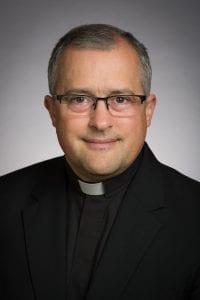
At the same time, the moral leadership of the Church has failed to resonate with many American Catholics who find the strong (if not exclusive) emphasis by many bishops on opposition to abortion and LGBTQ issues narrow and uninspiring As a result, many American Catholics have begun to lose hope in the Church
As Jesuits who deeply love the Church, we know that at its best, it is so much broader than this We know a Church of abundance and it is that Church that we want to proclaim and need to reintroduce to our institutions and to our world In an address to the leadership teams of the colleges and universities located in the Jesuits USA Midwest Province last fall (including their presidents and board chairs), Cardinal Blase Cupich of the Archdiocese of Chicago invoked this very Church and called Catholic institutions the “thinking heart of the Church.”


Kiser (continued)
A proper understanding of the heart of the Church and its teaching shows how much the Church actually has to offer to our world today The rich treasury of Roman Catholic Social Teaching in its totality expresses well the fullness of the Gospel of Jesus Christ in a way that points us all forward in great hope Those principles and their focus on human dignity can inspire us all and help us find new and powerful ways to deal with the sad fragility we see in too many of our students today
...Jesuits help bring a special focus on mission and identity to its work; we believe that this perspective is especially important on executive committees.
Two additional elements of the Catholic worldview supplement and expand the Church’s Social Teaching The first of these is the insistence of the Catholic Imagination that the world is a fundamentally good and privileged place where we find God, toward whom all investigation and exploration must ultimately lead, through science, the humanities, and more The second is the Catholic Intellectual Tradition built up over centuries, especially in philosophy and theology, which provides important foundations upon which to explore any and all moral or ethical questions being asked today
Finally, the Jesuit tradition itself adds its own distinctiveness to these powerful Catholic assets We have a “way of proceeding” that engages the world from a positive approach
Our strong emphasis on the service of faith and the promotion of justice, for which so many hunger, especially young people, are two things our world stands in need of today Against this background, let me explore several topics The first is with regard to both Jesuit and lay trustees on boards All of our schools need qualified Jesuits and qualified lay men and women on our boards It is critically important, in the times we are in, that board members are aware of the "Signs of the Times" like those I sketched above As Provincials, we believe we can be of great help to presidents as they seek talented Jesuits to serve on their boards We know that the number of Jesuits on college and university boards may need to be reduced going forward owing to our own Jesuit demographics Please know that Provincials want to be involved in this process and can help find good fits for the kinds of skill-sets presidents would like to see in Jesuits for their boards
Another issue that the Provincials have been discussing is ensuring that a Jesuit is always a member of Board executive committees No matter the committee they serve on, Jesuits help bring a special focus on mission and identity to its work; we believe that this perspective is especially important on executive committees The presence of a Jesuit on this central board committee ensures that the Jesuit charism is vitally present in all of the important issues that executive committees consider Whether this person is the local Jesuit superior, or another Jesuit, their presence on the executive committee likewise ensures a good link between the board and the Provincial


Kiser (continued)
Because the selection of a new president is perhaps the most important duty a board ever undertakes, it is appropriate to speak of the ways in which that process can best be informed by close contact with the Jesuit charism and its representatives Please know that Provincials understand that this is a work of the board and that we want to partner with boards in this process and not intervene From our point of view, the determining fact is that Jesuit colleges and universities are all sponsored works of the Society of Jesus Therefore, all presidents must be able to be missioned by their regional Provincials as directors of the work The role of the Provincial in the process of presidential selection is informed by and geared toward this requirement Not only ought Provincials to be kept informed as one presidential term comes to an end and a search is in the offing, but they ought also to be briefed at key steps along the way, usually through the Provincial Assistant for Higher Education (PAHE)
We believe that it is also a best practice to have at least one Jesuit serve on the presidential search committee, to make sure that mission and identity issues are well cared for by the search committee as a whole Without a doubt, the most important engagement of the Provincial as such will come as the candidate pool is being refined and finalists are being identified The Provincial must have the opportunity to interview the three or four semi-finalists to make sure that he will be comfortable in missioning them as directors of these works The Provincial will then provide his feedback to the board chair or in some other way that the two of them agree is appropriate
An obvious question which arises here is whether the president of a Jesuit college or university must be Catholic In the view of the Provincials, we believe that a Catholic candidate is typically preferred for many reasons ranging from the public roles presidents must play, to navigating the responsibility of relating to the local diocesan or archdiocesan ordinary, etc In general, we are interested in developing effective Catholic leaders and good, Catholic university presidents are among the kinds of leaders we need That said, we are aware that not all of the presidents today are Catholic and believe that a non-Catholic who is vibrantly committed to the mission of the university they are asked to lead can indeed be preferable to a Catholic whose commitment is only lukewarm
...All presidents must be able to be missioned by their regional Provincials as directors of the work.
Lastly, let me address the important topic of board formation in the context of Jesuit mission and identity, especially as board members are beginning their terms of service Just what would we Provincials like to see? What are we hoping for?
A little history is helpful here, I think, if for no other reason than reflecting on what our institutions have done in the past and are called to do today gives us a sense of what current content of trustee formation ought to be


Kiser (continued)
One of the distinguishing marks of Catholic higher education in general (and of Jesuit higher education specifically, especially in its early days) was that it made opportunities available to students excluded by the higher education establishment Catholic and Jesuit colleges and universities opened possibilities for social mobility to students who were often discriminated against
This mission of access is important to all of our colleges and universities today, as well, for they inherit the important legacies of their earlier days A question we may well ask ourselves is whether we are as committed to the social mobility of marginalized students as we ought to be as the generations who came before us were
But I think that more than access is at stake in the character of our Jesuit colleges and universities today We Jesuits have invested in higher education in the way we have because we believe that the institutions can engage the world around them with a moral vision, through which their constituents can encounter Truth, Beauty, and Goodness We want to see our students grow in their capacity to bring this vision to our world We hope our students are knowledgeable of and committed to a vision of the world with God at its center, so that the natural world and human society may better thrive And, if I may be so bold, ought we not always somehow introduce our students to Jesus Christ if not as the Son of God, then at least as someone who has had an enormous influence on our world?



Kiser (continued)
I would hope that current efforts toward trustee formation would acquaint trustees with what we Jesuits call the Universal Apostolic Preferences (UAPs) These overarching themes were given to us as a mission by Pope Francis in 2019 and are intended to guide all Jesuit works through 2029 There are four of these socalled UAPs: showing the way to God, walking with the excluded, accompanying youth toward a hope-filled future, and caring for our common home
I would likewise be happy if trustee formation programs and activities addressed some of those topics I addressed in my Composition of Place above, namely the way in which Ignatian spirituality offers a positive worldview that finds a pathway to God directly through an embrace of the world, or how the Catholic Intellectual Tradition powerfully animates a liberal education by providing students a deep and broad exposure to humanism, critical thinking, and the like I hope that this tradition has not become a luxury available only to students at our better-resourced schools! I would like to see trustees come to know about the ongoing importance of the Mission Priority Examen (MPE), and I would like to put in a plug for trustee formation practices that I know to be especially effective, namely pilgrimages and trustee retreats
In conclusion, I am thankful for what our presidents and board chairs have done, are doing now, and will do in the future for Jesuit higher education in the United States and Canada Our world and our students are depending on them!
Fr. Kiser discusses a variety of ways that the perspectives Jesuits bring to Boards of Trustees might be well used How are the Jesuits on your Board encouraged to use their specifically Jesuit “voice” during important discussions and decisions? And how do trustee formation programs at your school ensure that their voices are not the only ones who can speak about the Jesuit perspective in an informed manner?


By Joseph DeFeo, Ph D , Executive Director, Ignatian Colleagues Program
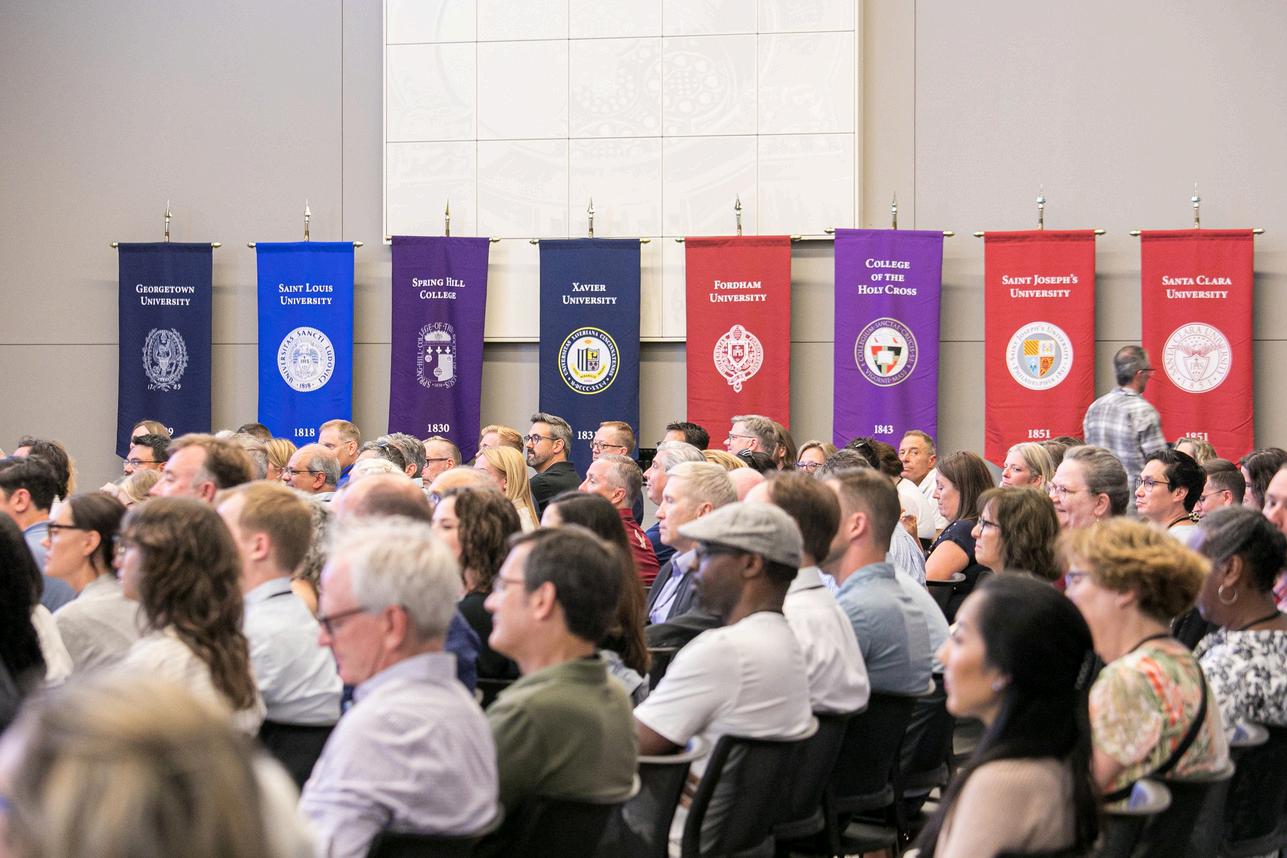
After more than two years of planning, a few thousand e-mails, many (many) Zoom sessions and other countless meetings, the AJCU Faith, Justice & Reconciliation Assembly came to fruition from July 16-19, 2024 at Loyola University Chicago
Attended by more than 360 faculty, administrators and staff, our gathering included representatives from 30 Jesuit higher educational institutions across the United States, Canada, and Peru, and many other friends and partners from the Jesuit Conference of Canada and the United States, all U S Jesuit Provinces, Alpha Sigma Nu, Ignatian Solidarity Network, Jesuit Refugee Service/USA, Loyola Press, and other organizations
Faculty participation accounted for more than one-third of attendees, marking a significant and welcome addition to the event
With nearly one-third of all attendees serving on either a commission or presentation team, a shared sense of ownership and pride could be felt throughout the Assembly What a gift it was to gather such a talented and generous community who care so deeply about Jesuit higher education and the work of faith, justice, and reconciliation
A running theme throughout the Assembly, “What do we owe” (to God, country, Church), stems from St Ignatius’ Spiritual Exercises through which one recognizes the overabundant love and grace of God In gratitude, one naturally seeks to respond through one’s service to others and asks, “What can I do,” i e , “What do we ‘owe ’”


Each plenary speaker rooted their remarks in our Jesuit and Catholic tradition, connecting us to the Spiritual Exercises, the Catholic Intellectual Tradition, Catholic Social Teaching, and the Gospels They reminded us that our tradition holds key resources as we engage in the work of justice within the context of faith and reconciliation, which includes a hopefulness that is never diminished
Within a theological framework, our first plenary speaker, Rev Marcel Uwineza S J (below), president of Hekima College in Nairobi, Kenya, shared his incredibly painful and hopeful story of survival, grace of conversion, and reconciliation as he addressed what we “owe” God, ourselves, and one another Our second plenary speaker, Interfaith America founder and president Eboo Patel (bottom right), referencing the visionary work of Rev John Courtney Murray S J , shared his experiences regarding the challenges and opportunities that pluralism brings, and offered several campus practices for civic pluralism in relation to what we “owe” our country.
And our third plenary speaker, Anna Bonta Moreland (below), the Anne Quinn Welsh Endowed Director of the Villanova University Honors program, reminded us that as Jesuit institutions, we are part of the Church, so what we “owe” relates to how we serve our students Noting that students today are struggling more than ever before, Moreland paired three major challenges with Ignatian strategies: Choice Paralysis / Ignatian discernment; Lack of Leisure / Cura Personalis; and Epidemic of Loneliness / Ignatian Detachment
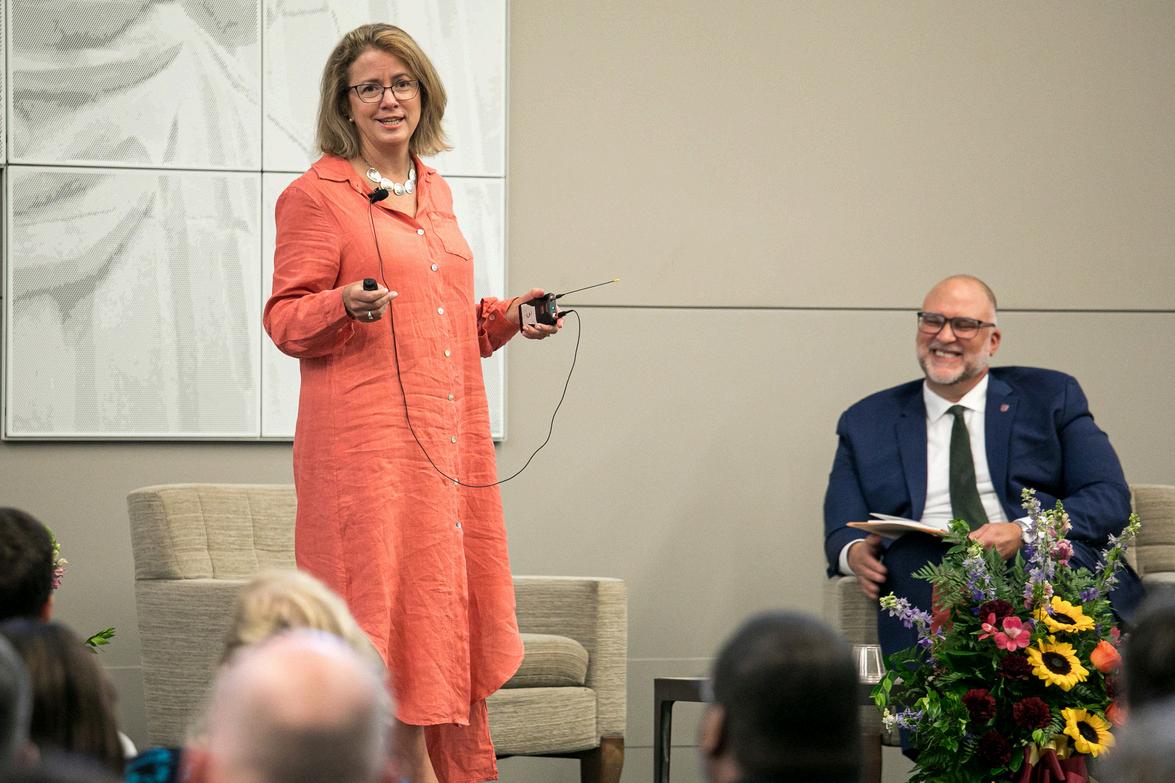
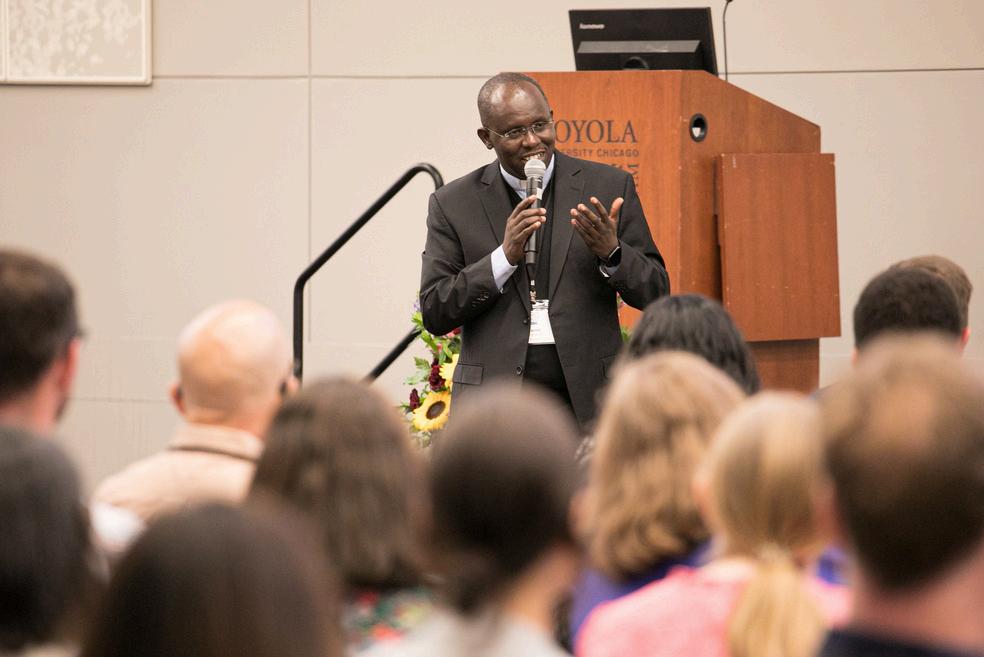
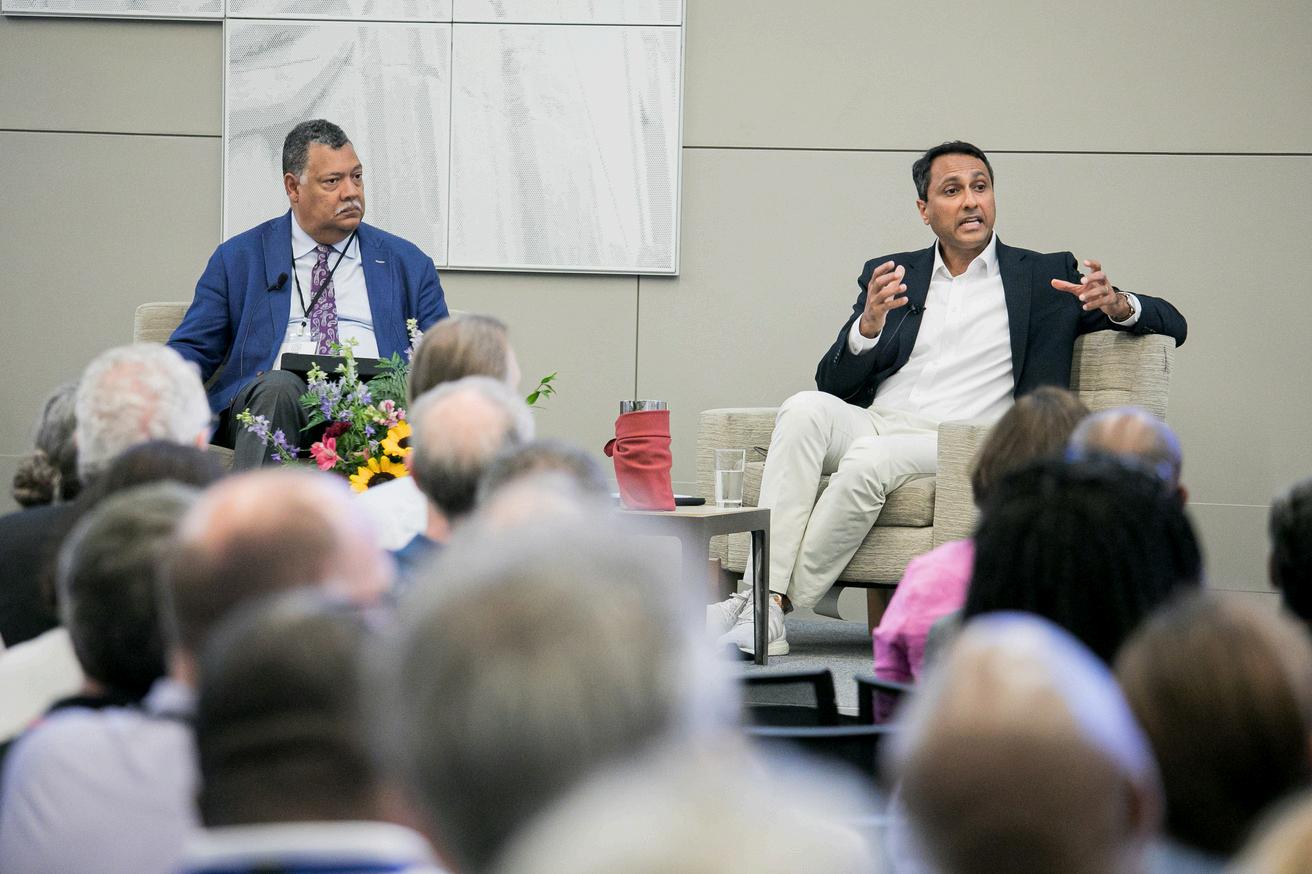


Assembly ‘24 (continued)
Each of the six Commissions, consisting of more than eighty-five faculty and staff who have been working together for the past eighteen months, provided examples of adapting our Jesuit and Catholic mission to the realities facing Jesuit higher education today Some are well advanced and have resources ready to share, while others are in earlier stages of development Some highlights include:
Proposals for an online certificate program on Ignatian pedagogy
The creation of a Democracy Examen Colleges and universities signing on to the Laudato Si’ Action Platform
Increasing the number of institutions offering Jesuit prison education
Engaging the painful institutional history of slavery and the oppression of indigenous peoples
A discernment tool for institutional policies
A facilitator’s guide for serving the spiritual and mental health of students
More than forty workshops, roundtables, lightning rounds, and poster sessions provided examples of ways that our schools are adapting the mission to meet needs on campus, at local and regional levels A panel discussion regarding Israel/Gaza, workshops on Ignatian pedagogy, poster sessions, and many others illustrated a rootedness and depth of engagement with our Jesuit and Catholic tradition
The depth of content and collaborative efforts among the Commissions and presentation teams, and their generosity of spirit, were powerful examples of the riches within our institutions and across our AJCU network In the months ahead, AJCU will review evaluations, gather commission co-chairs and others to consider what was learned, and map out next steps We will also remain attuned to identifying new areas affecting Jesuit higher education over the next few years as we plan for Assembly 2027, which Loyola University Maryland has so graciously offered to host (dates TBD)
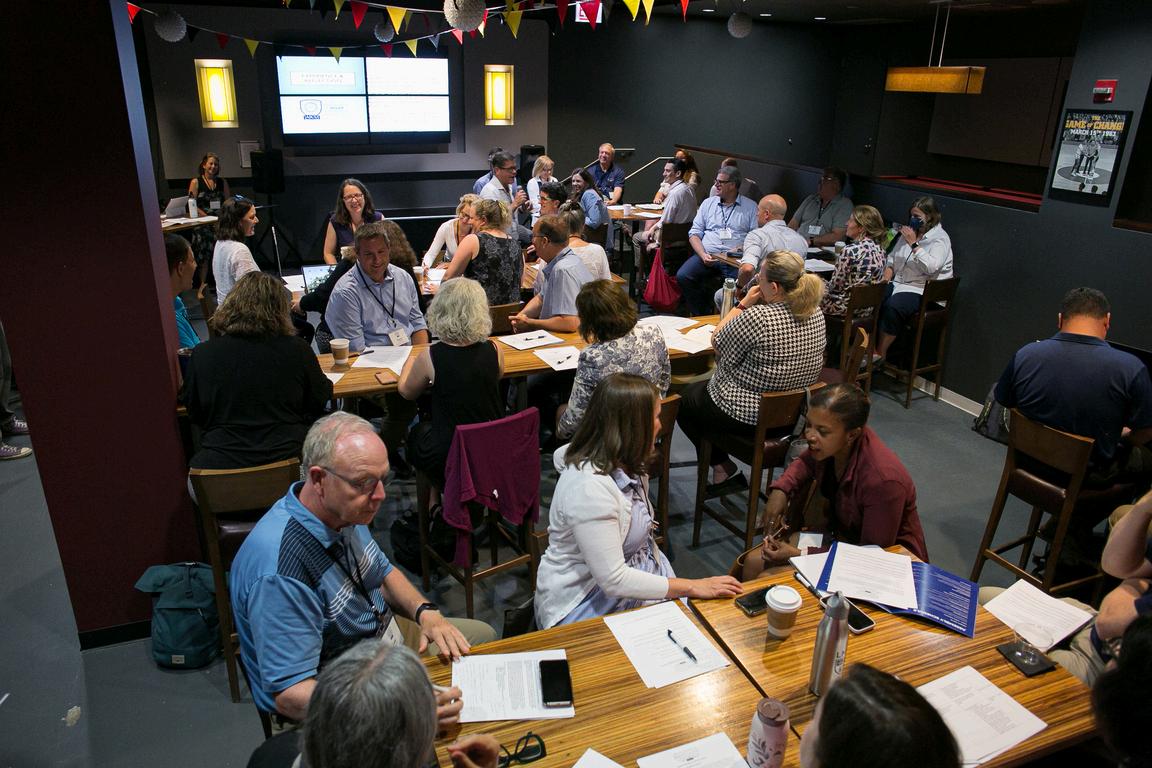
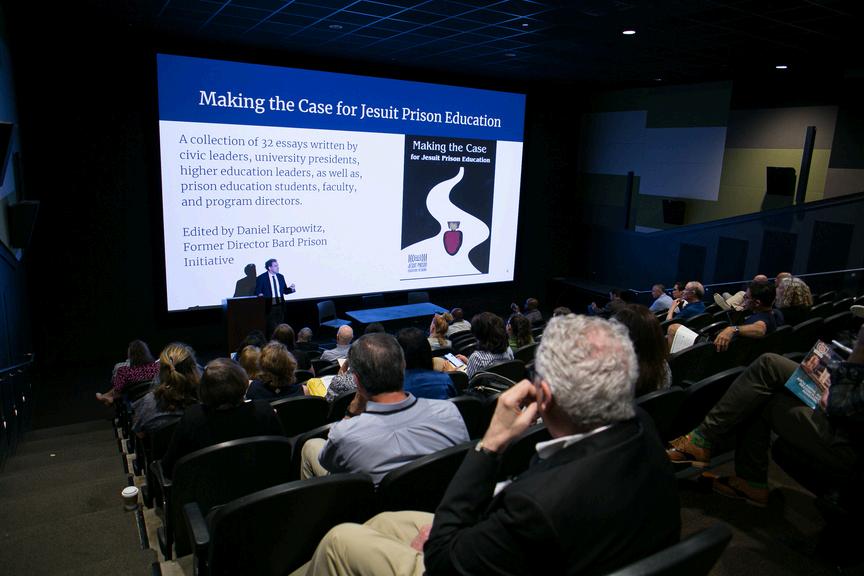


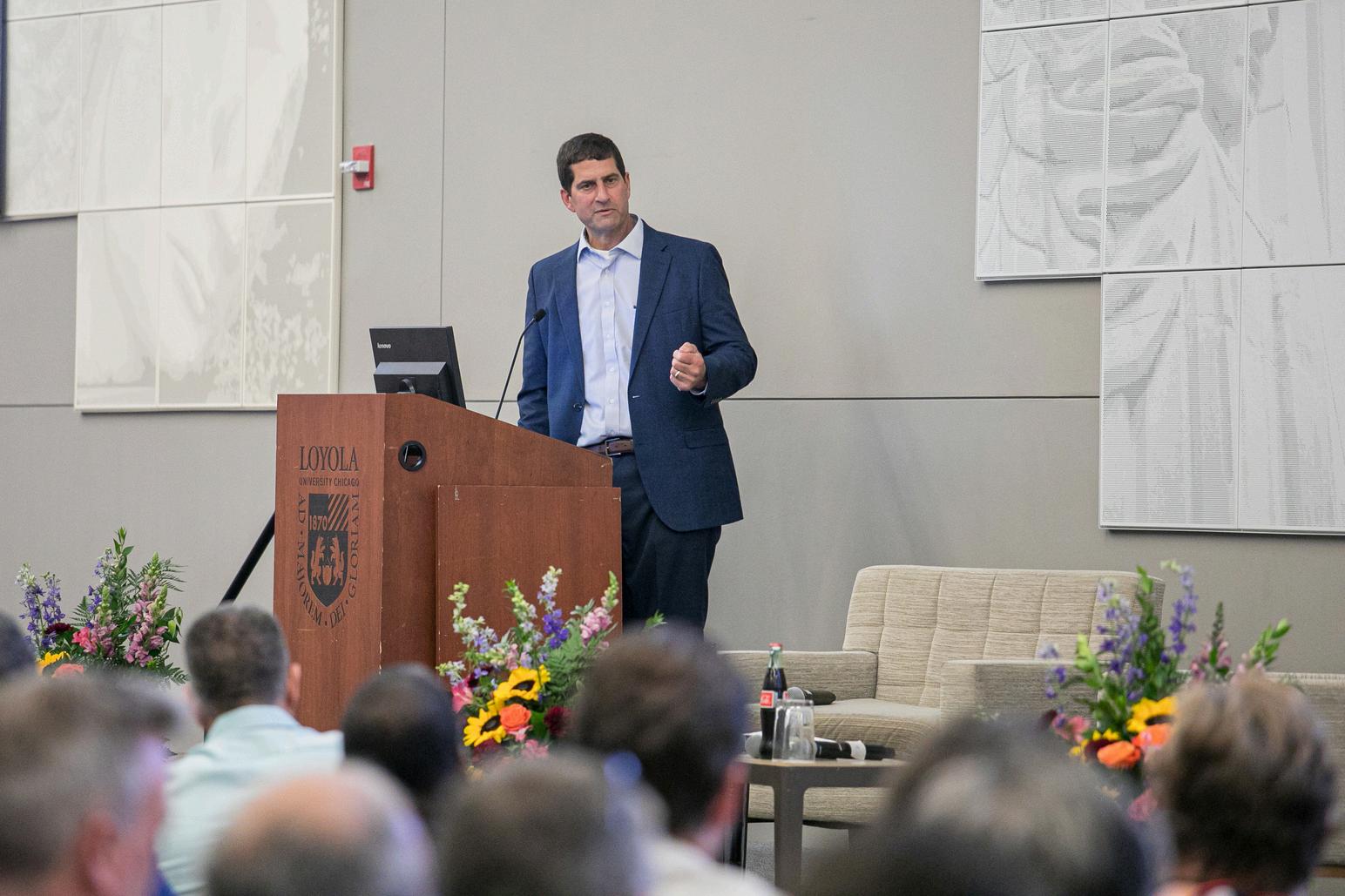
Encouraging institutions to send delegations was intentional Delegations serve as representatives, as witnesses of an event More important than AJCU’s efforts, Assembly delegates have the responsibility to bring back to their campuses what they learned, reflect on their experiences individually, with fellow delegates, share them widely among campus colleagues, AJCU networks and others, and consider how to respond Through actions like these, delegations and campus colleagues assure that the work of faith, justice, and reconciliation continues beyond the Assembly.
As I reflect on the Assembly, many consolations keep returning to me: the energy, sense of community, and hopefulness of spirit that was present during our time together. What struck me was how these endured throughout our gathering. One of my deepest hopes for the Assembly was to contribute toward the building up our AJCU network, not just of experts doing important work (which they clearly are), but also fostering our community of care and generosity for and with one another.
In both large and small settings, listening to presenters share their incredible expertise and bounty of work with generosity and passion, witnessing so many in-depth conversations during and after sessions in hallways, coffee breaks, socials and meals, appreciating new and veteran colleagues welcoming one another, and delighting in the many smiles, handshakes, compassionate embraces, hugs and abundance of laughter, were all consolations and confirmations for me that our Assembly met its mark and that our AJCU network reflects well our belief in a hope-filled future as we continue the work of faith, justice and reconciliation Rich is the harvest
Please Note: To access the Assembly Commission and plenary speaker videos, photo galleries, and other documents and resources related to the Assembly, please visit ajcunet edu/ajcu-assembly2024 (Above left: Joseph DeFeo)
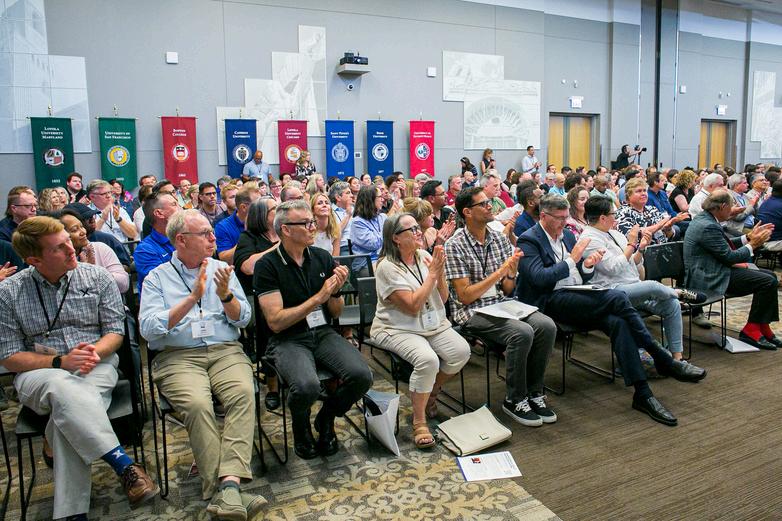


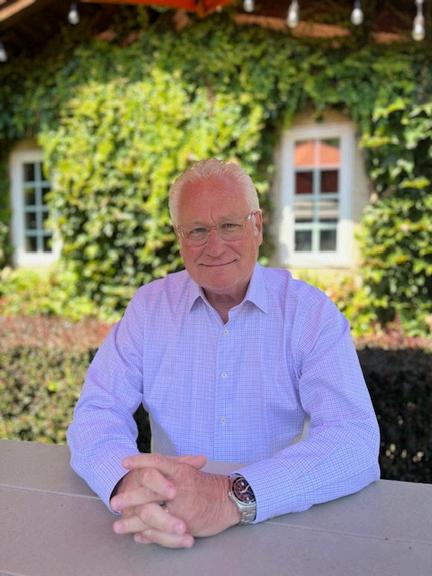
include one full day for committee meetings, a board dinner, and a five-hour Board meeting on the second day We have approximately fifteen standing Board committees
I have served on the Board for six years and am entering my third year of a 4-year term as Board Chair When Vice-Chair, Mary Del Santo and I started our Board leadership roles, we set a goal of establishing more interactive, transparent and engaging Board meetings
We built in time within each meeting to allow the Board to be able to discuss issues amongst themselves, ask questions, and brainstorm together on University challenges and opportunities.
In the past, we found Board meetings packed with back-to-back staff presentations, little time for questions, and almost no time for Board-only discussions Clearly, that format did not allow ample time for Trustees with deep experience in so many areas to speak with each other and brainstorm together on issues and potential strategies for USF As simple as this sounds, we also changed our seating arrangement, moving away from traditional auditorium seating and moving to a U-shaped format where Trustees are now all facing one another, which encourages more interaction, dialogue and engagement amongst fellow Board members
We ask that each staff report in our Board book include a 2–3-page executive summary and that all reports include progress metrics vs pre-approved goals established and approved by our standing committees We also set time in each Board meeting for committee chairs to have time to report status and updates on their committee meetings the day prior This allows the full Board to receive an update on the discussions that took place in committee


Chairs Corner (continued)
We also set a goal to have more social time together as a Board. We found that one of the many benefits of our work together is that Trustees truly enjoy the social elements of meeting and sharing time with fellow USF supporters.
During our summer break each year, we schedule a summer social event at USF’s Star Route Farms, where we walk our organic farm and enjoy an afternoon together with a meal and social time in this beautiful setting. This event is typically very well attended by Trustees and families and allows time for us to simply enjoy one another outside of any Board meeting or predetermined agenda.
The changes we instituted were all designed to encourage our Board to have a more robust and enjoyable experience as a Board. We also wanted to respect the time and commitment of the Board members and, at the same time, appreciate the service and talent that the Board brings to our University.
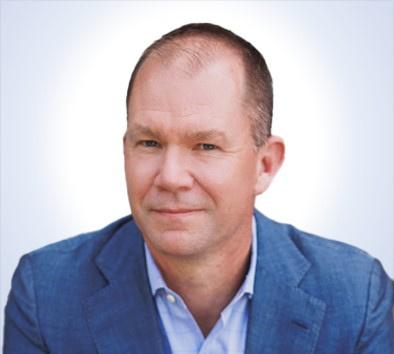
It was a truly enriching experience to meet my fellow Board Chairs, Presidents, and Provincials at the April 2024 AJCU gathering in Chicago. We all share the same mission, and it was inspiring to hear Jesuit Superior General Rev. Arturo Sosa, S.J. issue his call for collaboration. As we each play our part in this Jesuit, Catholic educational charism, I am eager to share our collective insights as we navigate the challenges of governing our institutions
By way of background, my name is Derek Scarth, and I am the Board Chair at Regis University I have been a trustee for over a decade and the current chair for just over a year Our Board consists of thirty individuals, eight of whom are Jesuits or members of another religious community In addition, we are very fortunate to have two former Jesuit university presidents as trustees



Chairs Corner (continued)
Like many of our institutions, Regis has faced its share of challenges over the past few years, but turned a corner in January 2023 with the appointment of Dr. Salvador D. Aceves as our first lay and first Latino President. This served as an excellent opportunity for our Board to hit the “reset” button. I would frame our efforts around three phases – Board structure, Board focus, and Board formation.
As a new Chair supporting a new president, my first goal during phase one was to re-center us around bylaw revisions, previously the responsibility of our Executive Committee. Our bylaws were reasonably structured, but with significant organizational change, it was imperative that our entire Board revisited how to govern intentionally toward the mission. As a result, we established a governance committee tasked with gatekeeping the charters for our nine committees and ensuring proper accountability for all trustees, committee chairs, our vice-chair, and the Board Chair.
Phase two was centered around my second goal: to recast the mission at the core of the Board's work It is challenging to embrace the importance of discernment when our role as leaders is to guide and make decisions in real-time Over the years, our Board strayed from appropriate reflection Managing the enterprise took on greater importance and consumed too much of our time There needed to be more hours between the scheduled meetings to complete the work
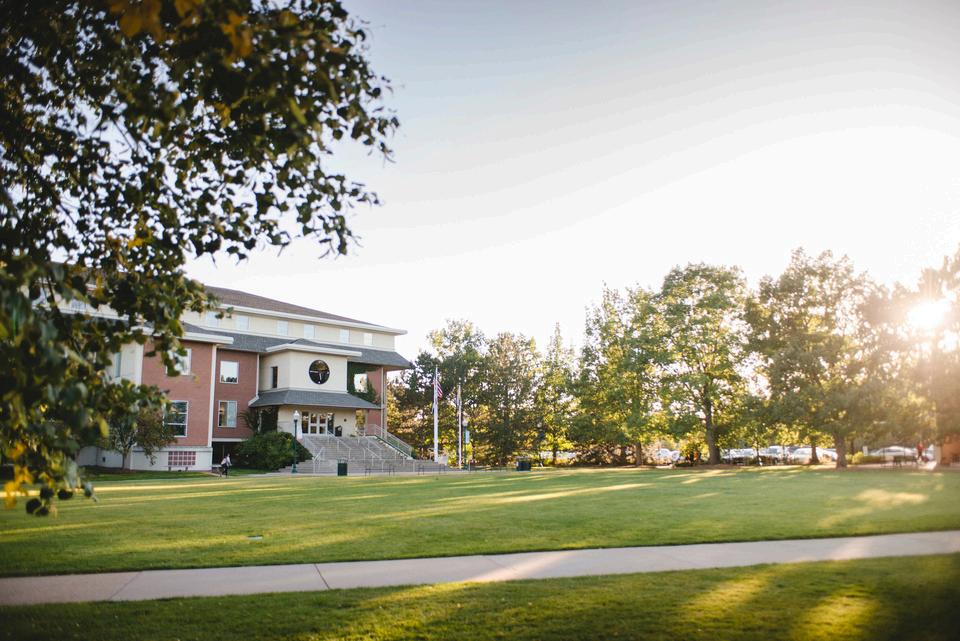
To address this, we encouraged intraquarter meetings for committees to properly attend to critical items. During our general business meetings, we established a protocol to focus on actionable items from the committee chairs, trusting the work and resulting recommendations made at the committee level This time-saving measure has allowed us to be more contemplative in strategic discussions
Phase three will be about Board formation I am excited to learn from your experiences and discuss best practices in governing By leveraging our unique resources, I believe we can achieve greater impact individually and collectively as a community of Jesuit, Catholic colleges and universities I look forward to our strategic conversations


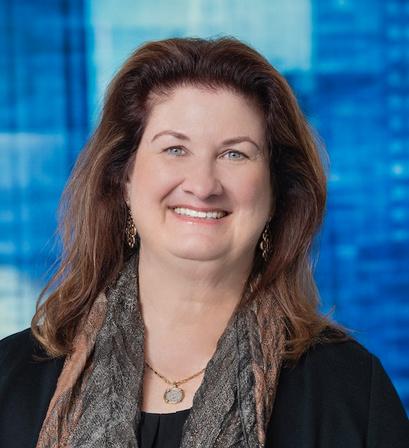
Prior to assuming the role of Chair of the Board of Trustees at Rockhurst University, I spent a great deal of time reflecting upon the roles, responsibilities, and the positive impact that the members of the Board and I could have on the University. I was fortunate to have the opportunity to speak with our Provincial prior to the start of my term. I expressed my apprehension on taking on the role and filling the shoes of the previous chairs He gave me some great advice and, in my mind, permission to be different and to leverage my own talents in this leadership role That conversation helped me prepare for the transition
For more than 35 years, I worked in the corporate world with an emphasis in audit and operations So naturally, I reflected on what was working well for the Board and where opportunities for improvement existed I also needed to determine the best way to support the University, at a time when higher education faced many challenges and our president was just beginning her second year
Even though I co-chaired the Presidential Search Committee and met the new president several times, we needed to establish a strategy for working together. Fortunately, this was not difficult for us. We quickly established a relationship built on regular, transparent communication and clarity around the roles of Board leadership and administration. It was important to me that she felt supported, had the authority to lead without a micromanaging board, and that our relationship be based on mutual trust.
First, board governance needed to be addressed. This resulted in a significant update to the Bylaws to reflect best practices in shared governance. In addition to an analysis of committee accountabilities, we created an Enrollment Management and Marketing Committee. Structural changes at the University and the growing competition for a shrinking pool of applicants contributed to the Board’s support for this change.
Second, we needed to recalibrate as a board on mission governance The previous year, we transitioned from a Jesuit priest leading the University to our first lay and first female president I thought it was important for the Board to review our commitment and understanding of our mission We were fortunate to receive help from AJCU and Rev Michael J Graham, S J to lead our retreat


Chairs Corner (continued)
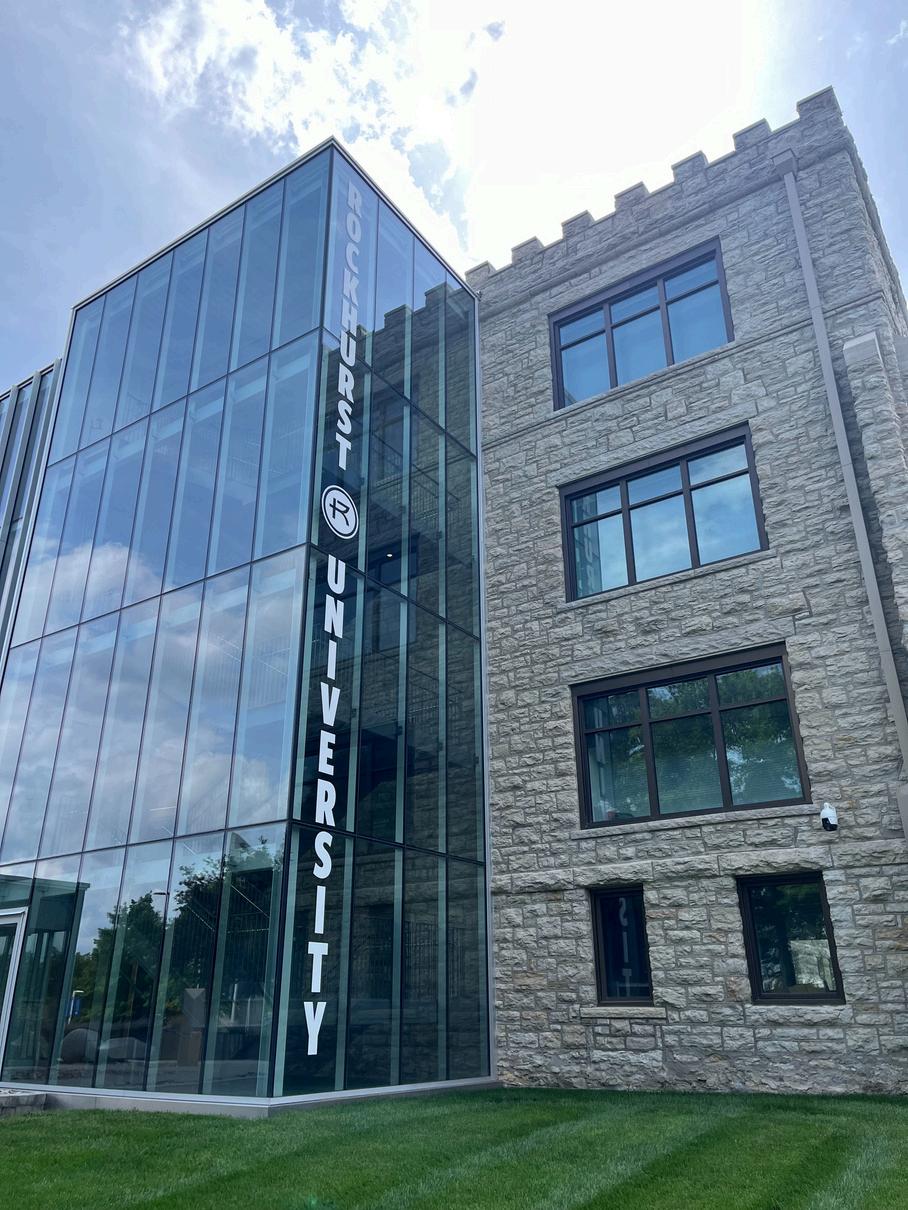
Our retreat centered on the role of trustees around mission governance. We completed readings and discussed the Characteristics of Jesuit Higher Education, the Universal Apostolic Preferences, and the relationship between the mission and the public face of the university. This retreat provided an opportunity for trustees to engage more deeply with the president around our commitment to mission governance. From that experience, we made a significant change in how the Board operates. We carved out more time dedicated to mission, returned to inperson committee meetings whenever possible, and committed to spending more time together outside of meetings to get to know one another better Building relationships outside of meetings helps build openness and trust among our trustees
I have now completed my first year as chair Strengthening board governance and recalibrating our work on mission governance helps us conduct our work more efficiently and effectively A positive relationship between the president and board chair is essential as we navigate the challenges facing our colleges and universities
One of the topics that USF Board Chair Jack Boland reflects on is the importance of fostering a positive culture among board members. In what ways does your own board strengthen its culture?
Regis Board Chair Derek Scarth reminds us that boards contribute to institutions best when they help them discern actions thoughtfully, not when they are too engaged in the management of institutions as difficult times sometimes seem to require How does your own board observe the difference between “governance” and “management”?
Rockhurst Board Chair Nancy Creasy described several structural changes she helped bring to the Rockhurst Board. Has your board adapted its own structures or ways of proceeding in light of your school’s specific situation and circumstances?

ByRev.PatrickKelly,S.J.,Associate ProfessorofReligiousStudies,University ofDetroitMercy;FormerChair, IntercollegiateAthleticOversight Committee,SeattleUniversityBoardof Trustees
AJCU: It’s safe to say that, for most of us, intercollegiate athletics has changed more in the past five years than ever before. Can you summarize those changes and suggest what is driving them?
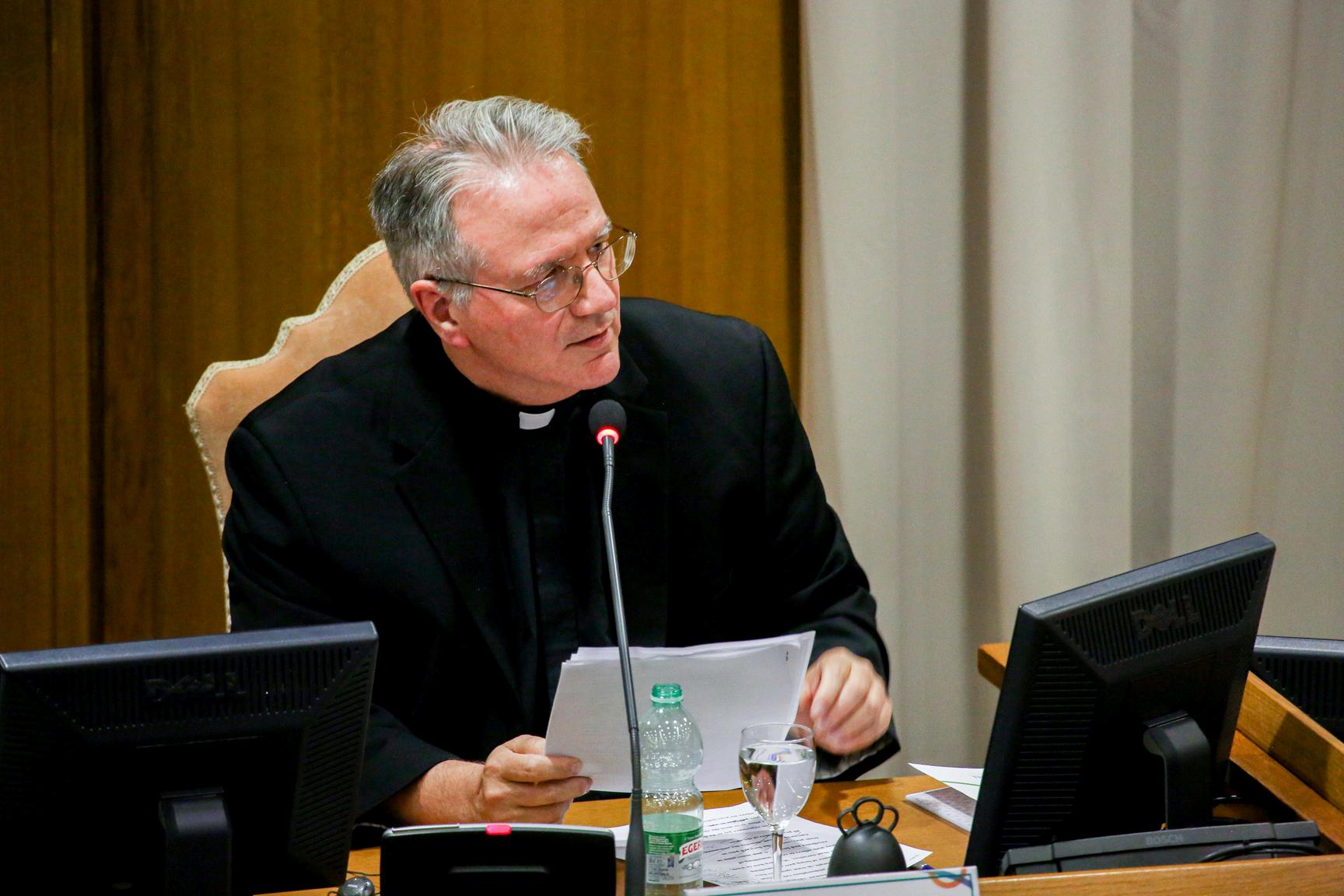
Rev. Patrick Kelly, S.J.: Three main drivers of the changes happening in recent years are the dramatic increase in the amount of money in intercollegiate athletics, the rise of television contracts, and antitrust court cases. Because of intercollegiate athletics’ popularity, and what could turn at times into a mania for winning, stories about money’s influence have been present since the beginning. Many of the rules that were developed by the NCAA at various stages were meant to keep college athletics distinct from professional sports and maintain its connection to education.
A new era of televised sports coverage began with the advent of ESPN in 1979, which made round-the-clock cable coverage of college sports possible. Other networks also increased their coverage and, in the process, college sports became a more pervasive part of the cultural landscape in the United States.
(Above)Rev.PatrickKelly,S.J.
A 1984 U.S. Supreme Court anti-trust lawsuit, NCAA v. Board of Regents of the University of Oklahoma (based on the premise that a free market is the best way to allocate the nation’s resources), ruled against the NCAA’s control of negotiations with television networks for football coverage. The ruling allowed individual schools and conferences to negotiate football television contracts directly, which led to more games being televised and larger deals. The television coverage of the NCAA Division I (D-I) men’s basketball tournament also began to bring in more exorbitant amounts of money. The financial windfall for the highest levels of D-I intercollegiate athletics led universities into an ‘arms race’ for better facilities, stadiums, higher coach contracts, etc. While few of even the most well-resourced athletic programs made a profit for their universities, they were pursuing what was most helpful for them to gain a competitive advantage.
Intercollegiate Athletics (continued)

In recent years, other anti-trust court cases have lifted the cap on educational benefits that schools could offer student-athletes; opened up the free market for them to receive Name, Image, Likeness (NIL) money; and to transfer schools without having to sit out before competing again.
Another related development has to do with debates about whether young people who participate in intercollegiate athletics are “student athletes” or “employees.” In 2021, the National Labor Relations Board ruled that student-athletes can be properly classified as employees of their universities. In March 2024, Dartmouth College basketball players formed a union. The College will not bargain with them, though, saying that “athletes in the Ivy League are not employees.” The U.S. Court of Appeals for the Third Circuit ruled in the Johnson vs. NCAA case in July 2024 that studentathletes can be classified as employees of their institutions. That case will continue making its way through the courts.
AJCU: With all of the focus on these issues, are there other topics being overlooked?
Kelly: With all of the attention being directed to who has the right to access the large sums of money at the highest levels of college sports, what is omitted is any meaningful discussion of sport itself, its human and cultural significance, and how it is related to education.
These are issues that must be addressed in any ‘educational framing’ of this topic. Such issues only appear in the dissents or ‘qualified’ concurrences of the court cases. In the dissent of Justices Byron White and William Rehnquist in the 1984 Board of Regents case, for example, they wrote that intercollegiate athletics is not a “purely commercial endeavor in which colleges and universities participate solely, or even primarily, in the pursuit of profits.” Rather, it is a “vital part of the educational system.”


Intercollegiate Athletics (continued)
Third Circuit Judge David Porter did not accept the reasoning of the majority in Johnson vs NCAA about whether student athletes are employees because the majority does not clarify the “critical distinction” between “service,” “labor,” or “work,” and play or sport An obvious starting point in such considerations, he says, is to ask whether “a student-athlete may play her chosen sport because she wants to play, not to work primarily for her university’s benefit Play is arguably a human good that many pursue for its own sake ”
While it is beyond the purposes here to discuss in depth, many psychological studies have demonstrated the relationship between play and human development To take just one example of how playing sports can lead to the development of the person: In the United States, many young people have their first experiences of being a part of something larger than themselves while playing on sports teams They learn how to develop their own skills and personality in such a way that they can contribute to the goals and success of the team And those lessons continue as they play sports even at the intercollegiate level As Pope Benedict put it:
“In team play, the player learns to put his individuality in the service of the whole. Sport unites people in a common goal: the success and failure of each one lies in the success or failure of everyone. ”
What is also omitted in the current framing is how a too narrow focus on external goods such as money or prestige can corrupt sport itself and education Such external goods that are connected to the most popular college sports accrue to individual persons or institutions
Regarding sports primarily as a means to these ends introduces a kind of individualism that has been present in recent decades in the wider culture into sport itself As was mentioned, one of the ways that sport leads to the growth of young people is that they learn how to develop their own skills and other capacities, but in such a way that they work together with others toward a common goal That is changing and there is a tilt in the direction of the individual student athlete’s focus on pursuing external goods In recent decades, youth sport is being viewed increasingly as a means for individual children to earn a college scholarship And youth sport is increasingly becoming “pay to play,” which makes it inaccessible to many young people from poorer communities The transfer portal that allows student athletes to play right away after transferring, along with the fact that there were initially no guardrails or regulations related to making money on one’s name, image and likeness, have also had the unintended effect of moving college athletics more in this direction


Intercollegiate Athletics (continued)
AJCU: Is a “new normal” in sight? What might it look like when it arrives?
Kelly: It is hard to predict The changes have come so fast and they will keep coming because lawsuits will continue to make their way through the courts Congress will also likely pass legislation at some point in the future (this is not likely to happen now, in election season)
There is an “individualism of institutions” where schools are all doing what brings in the most money for them and gives them the greatest competitive advantage.
You may have seen that to avoid treble damages in the 2020 House vs NCAA antitrust lawsuit, the NCAA and Power 5 conferences proposed a settlement (which will also serve as a settlement for two or three other cases and still needs to be approved) As part of the proposal, the NCAA and D-I conferences will pay $2 8B to student athletes who were not able to make money from NIL agreements, going back to 2016 when the statute of limitations ran out The NCAA and D-I schools are also proposing as part of the settlement a new arrangement where the Power 4 (now without the Pac 12 Conference) conference schools and any other D-I schools that want to, will pay a minimum of $30,000 to half of their student athletes directly This will be a momentous change from the amateurism model that the NCAA has long defended, in that student-athletes will be paid directly for playing their sport
The NCAA and Power 5 conferences settled the House case to avoid paying triple the damages But the new massive football television deals that led to conference reorganizations will help these schools to weather the storm and continue to build facilities, pay coaches exorbitant salaries, and now pay players directly So, in a sense, the rich will keep getting richer
Most of our D-I Jesuit schools don’t sponsor football, but some have nationally prominent men’s and women’s basketball programs These schools won’t benefit from the new football television money, and will also be getting less for the NCAA basketball tournaments, as some of that money will be used to pay the $2 8 billion settlement
Val Ackerman, the Commissioner of the Big East Conference, has objected strongly to the amount of money that Big East schools have to pay She says it is unfair given that the lawsuits were brought by student-athletes in the Power 5 conferences And the bulk of the payments will go to student-athletes in those conferences, particularly football players
Basically, I think we are still going about everything in the same way that led us to our current situation There is an “individualism of institutions” where schools are all doing what brings in the most money for them and gives them the greatest competitive advantage This fits well within a business framing of college sports that trusts that a free market is the best way to allocate the nation’s resources



However, increased freedom for some schools and student-athletes may end up meaning less freedom for others Will other non-football playing D-I schools feel pressured or coerced into directly paying some of their student-athletes $30,000 per year, even if this is inconsistent with their philosophy of education, so that they will be able to continue to compete for the best players and in March Madness? In order to afford to pay half of their student-athletes, will some D-I schools have to drop non-revenue producing sports, depriving many student-athletes of the freedom to participate in intercollegiate athletics at all?
I mentioned earlier that one of the ways that participation in sports leads to the growth of young people is that they learn how to be part of something larger than themselves In this way, they can be introduced to the notion of the "common good”) It would be helpful if the decisionmakers and leaders in college sports would take this lesson to heart And if conference leaders would convene discussions having to do with values in sport that are broader than winning and money, that could help us to understand how sports are related to education Intercollegiate
The NCAA and its member institutions have failed so far to convince the courts of the connection between sports participation and the educational mission of our universities For those who cannot accept the complete severing of athletics from academics in our institutions, this is still an issue that needs to be resolved
AJCU: How do these changes impact the relationship between student-athletes and the schools for which they compete?
Kelly: At Jesuit schools, we try very hard to ensure that student-athletes are part of the student body This is important to do in part because such a very small percentage even of the best D-I studentathletes go on to play their sport professionally
Most students who play sports on our teams have gotten a lot of attention for sports since they were very young They may have even attained celebrity status at their high schools and in their local communities Some have developed a “foreclosed identity” around sports before they have had a chance to explore other identities So one of the more important things that a Jesuit (or any university) education can help them to do is to pivot to the rest of their lives This happens as they discover what gives them joy in their studies or service learning, what their talents and gifts are, and how they can use these to work with others to serve and build up the community It is important at this time in their lives that they develop genuine relationships with other students and are provided with opportunities (academic and otherwise) to explore meaning and purpose in their lives.


Intercollegiate Athletics (continued)
But this kind of formation is undermined if students are moving from one school to another too often, which is what the loosening of restrictions on the transfer portal and the focus on NIL money has led to
AJCU: What questions ought trustees be asking now and going forward?
Kelly: The most important question is: How is our intercollegiate athletics program meaningfully integrated into the Jesuit education that students receive? There are concrete steps that can be taken to ensure that this is the case
Coaches and athletic directors know from years of experience and reflection what the human and educational significance of sports is (If they don’t understand its educational significance, they shouldn’t be coaching in a university setting ) Drawing on their experience and that of student-athletes, the athletic department should develop a mission statement that expresses clearly the way that participating in intercollegiate athletics is related to the Jesuit educational mission
I think particularly in our context today our boards should consider having an Intercollegiate Athletics Oversight Committee (IAOC) If an IAOC is present, the Athletic Department’s mission statement can be approved by its members (Boards that are considering establishing an IAOC may find it helpful to consult the Association of Governing Boards of Universities and Colleges’ “Statement on Governing Boards’ Responsibilities for Intercollegiate Athletics” and other helpful materials at agb org )
I chaired the IAOC at Seattle University for seven years, while we were transitioning from Division II to Division I athletics We would occasionally invite head coaches to our meetings to talk about their programs One question we always asked them was about how the experience of playing on their team related to the Jesuit educational mission? At the very least, this put the question on the table and gave them the opportunity to think about it It signaled that this was an important issue to the trustees and to the University
There are other ways of assessing how well your university is doing in relation to intercollegiate athletics being meaningfully integrated into the Jesuit educational mission One way is to establish a tradition of receiving feedback/evaluations from all studentathletes at the end of every school year Also useful are in-depth senior exit interviews, which can be conducted inperson by faculty and other university community members outside of the athletic department
Drawing on their experience and that of student-athletes, the athletic department should develop a mission statement that expresses clearly the way that participating in intercollegiate athletics is related to the Jesuit educational mission.


Intercollegiate Athletics (continued)
Trustees also ought to inquire as to their institution’s stance on paying some of our student-athletes directly to play for our teams If Power 4 schools move forward with their plan to pay $30,000 to half of their student-athletes, pressure may be felt in some of our non-football D-I programs to make these payments in order to be able to compete at the national level in basketball and other sports
There is a financial dimension to this decision But there is also a philosophical dimension Paying student-athletes directly for playing would seem to move our players more firmly into employee territory What is our stance about some of our student-athletes being regarded as employees of a university? In the Johnson vs NCAA case, the question of whether the students are “student-athletes” or “employees” hinges on whether their athletic participation primarily benefits the students in an educational sense, or the university Are we willing to say that participation in intercollegiate athletics is no longer primarily part of the educational experience for some of our student-athletes?
AJCU: What gives you hope in the present situation?
Kelly: The dizzying pace of change in intercollegiate athletics and the issues that are still being contested are requiring universities to be more reflective about why they have athletic programs in the first place and to be more explicit about how these programs are related to their educational mission This is not something that universities have had to do in the same way in earlier eras
The fact that this hasn’t happened in a sufficient way before now is part of the reason we are in the current situation Without an account of the human and educational significance of sport, it becomes more vulnerable to being regarded merely as a means to the ends of money, institutional prestige, etc It is only a small step from there to regarding our student-athletes as means to ends
Now there is an opportunity to become more reflective about what we are doing and how to become more intentional as we go forward This may result in needing to make difficult decisions and even changes in the years ahead But my hope is that this process will help to make us more faithful to our Jesuit heritage and educational mission and that, in the end, this will enable us to better serve the young people who come to our schools
To learn more about Fr Kelly’s biography and work, please click here
Fr Kelly makes a variety of suggestions as to how boards might best exercise their governance responsibilities with respect to intercollegiate athletics How does your board exercise this important oversight? Are any of his specific suggestions (e g , ensuring that intercollegiate athletics are wellintegrated within your school’s overarching Jesuit purpose, creating departmental mission statements, conducting exit interviews for your student-athletes, etc.) elements of your own school’s approach? How might they become implemented?


By Rev Michael J Graham, S J , Liaison for Higher Education, Jesuit Conference of Canada and the United States
The Association of Jesuit Colleges and Universities (AJCU) is pleased to announce that it will convene the next AJCU Trustee Forum at Loyola University Chicago from 4:00 PM on Friday, October 11 to 12:00 PM on Sunday October 13. This Forum will build upon the successes of previous iterations and has been adapted based on feedback from past participants.
As before, our emphasis will be on the multiple ways in which the underlying Jesuit and Catholic mission touches all aspects of our schools’ identities, shapes the work of trustees, and contributes to the growth and perspectives of the trustees themselves. The October Forum will examine, for example, how the Catholic Intellectual Tradition and Catholic Social Thought should shape curricular issues fundamental to Jesuit and Catholic higher education. Other speakers will explore how students today differ from those of previous generations in important ways and how AJCU student life personnel therefore adjust programming to meet current student needs in line with Jesuit and Catholic values.
Our time together will balance input on key issues from a variety of speakers with time to consider implications for governance. Relationships between AJCU schools and the Jesuit Provinces within which they are located will be a particular point of discussion
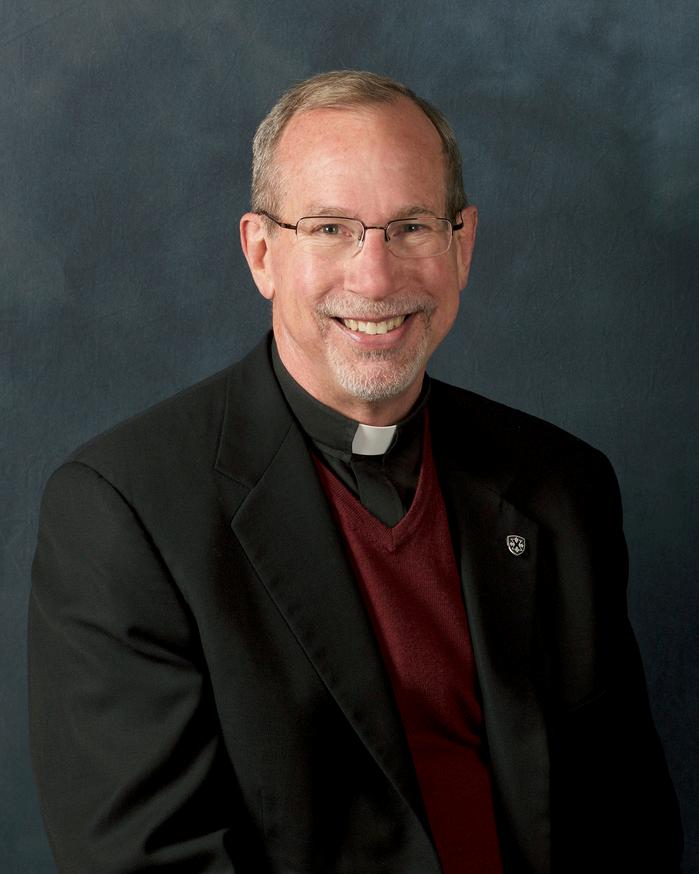
A special focus will also be given to the Mission Priority Examen (MPE). Through this important process, Rev. Arturo Sosa, S.J., the Superior General of the Society of Jesus, can affirm that our schools are faithful indeed, vibrant examples of Jesuit and Catholic higher education. Several Provincial Assistants for Higher Education will join us for our conversation on the MPE.
Loyola University Chicago’s President, Dr. Mark Reed, (formerly president of Saint Joseph’s University in Philadelphia) will likewise share his perspective as a president at two different AJCU institutions, located in two different Jesuit Provinces. This session will help orient trustees to specific work they will engage at their schools: not only the MPE, but initiatives under the general heading of the Universal Apostolic Preferences, which were affirmed by Pope Francis for the Society of Jesus after an extensive discernment process, and which guide all works of the universal Society through 2029


Several specific conversations will take place regarding important issues faced by individual campuses, not only to surface these for discussion by the group, but also to explore how Jesuit principles of discernment might contribute to board conversations on important issues Likewise, there will be a good deal of unstructured conversation for participants to share things that are on their minds, ask questions of presenters, and get to know each other better Trustee Forum (continued)
Finally, based upon feedback from previous participants, the weekend will provide ample time for both formal and informal conversation Trustees who have attended the Forum in the past report that one of its most important features is the opportunity to get to know trustees from other institutions, compare notes, and build a network
To learn more about the AJCU Trustee Forum, please visit ajcunet edu/trusteeforum To register for the October 2024 program, please click here (the registration deadline is September 23) We look forward to welcoming you to Loyola University Chicago in October!
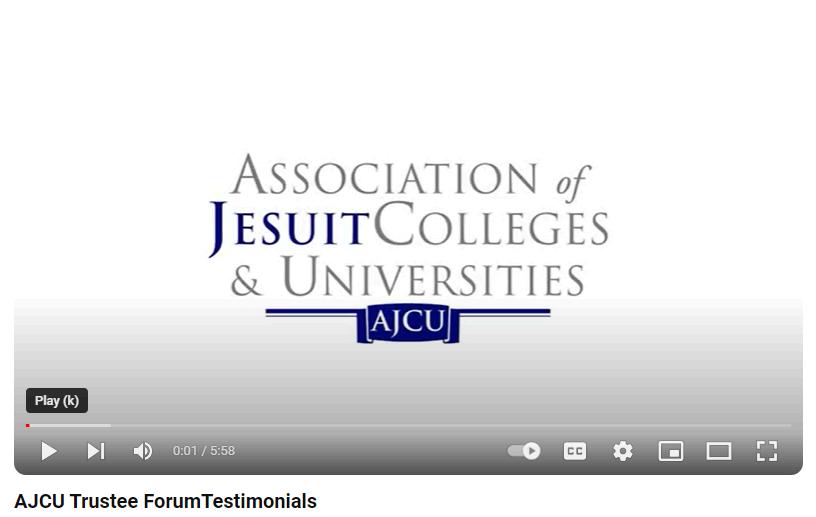


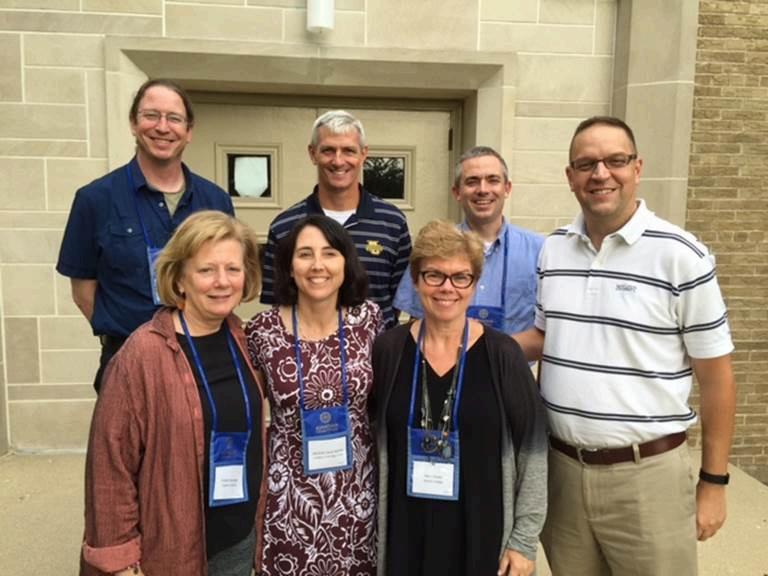
On June 9, Dr Michael R Lovell, president of Marquette University, passed away in Rome, while on a pilgrimage with his wife and members of the Board of Trustees President Lovell had been battling sarcoma for three years; click here to read his obituary and view a recording of his funeral
In addition to serving on the AJCU Board of Directors, President Lovell also participated in AJCU's Ignatian Colleagues Program (ICP), as a member of Cohort 8 (President Lovell is pictured above in the back row, second from the left) ICP's executive director, Joseph DeFeo, offered a reflection on President Lovell:
One of President Lovell's lasting gifts to ICP, and especially the Marquette community, was through the development of his ICP Mission Project
Mike's project, Developing a Pilgrimage of Spaces and Artifacts on Marquette’s Campus that Highlight and Promote our Jesuit and Catholic Identity, catalogued and organized on campus sacred spaces and artifacts to make it easy for anyone to perform a pilgrimage on campus and appreciate their breadth and beauty The chapels and sacred spaces were photographed from multiple angles so that with the catalogue, an online virtual tour would be available to those who cannot physically come to the campus His final phase of the project was to obtain new artifacts and create new spaces that would further demonstrate Marquette’s Catholic and Jesuit identity How beautifully Mike’s project illustrates his sincere love and commitment for our Catholic and Jesuit identity now illustrated in a way for all at Marquette, online visitors, and future generations to cherish
